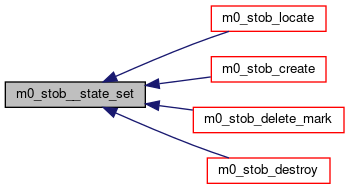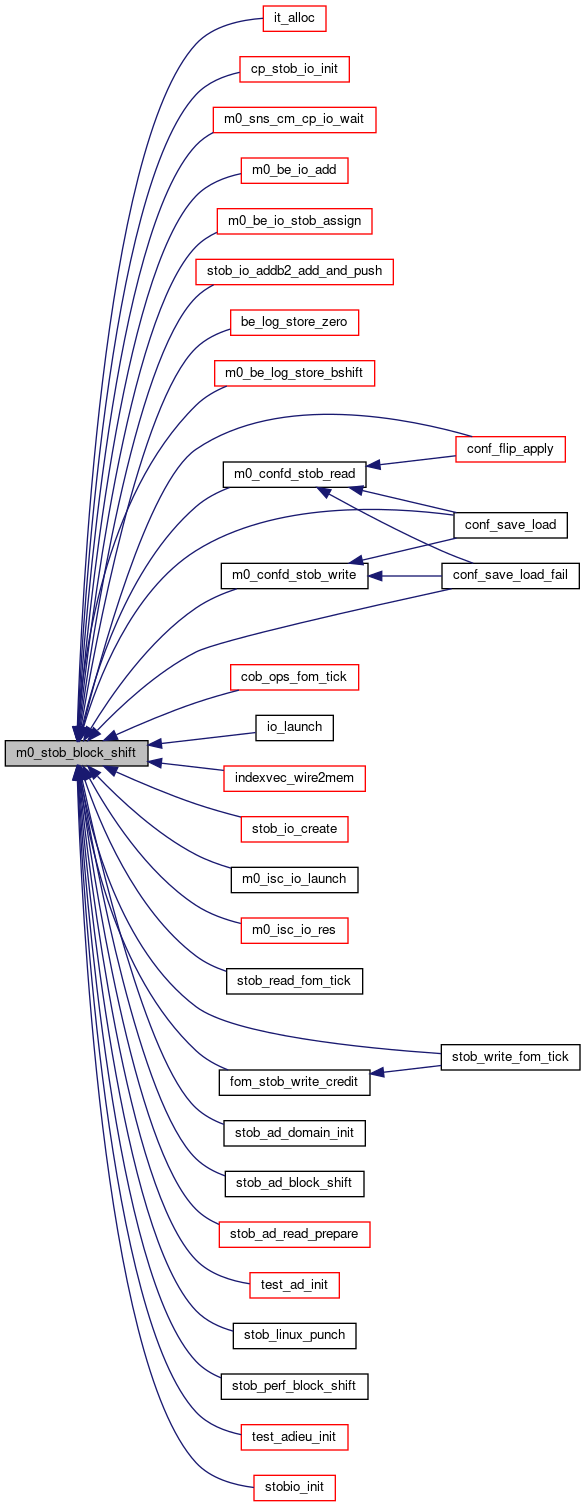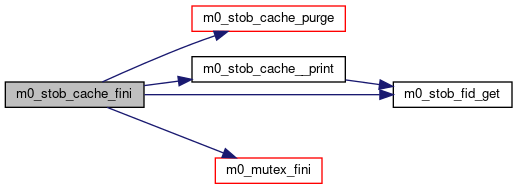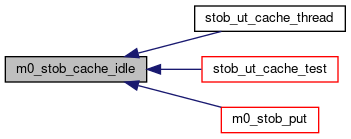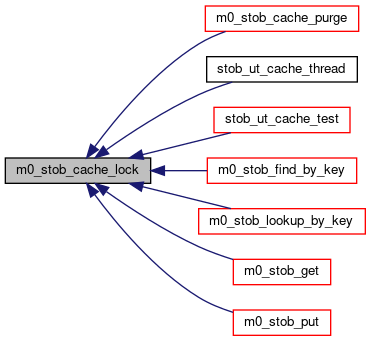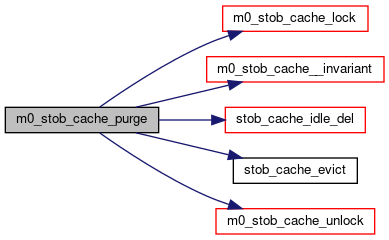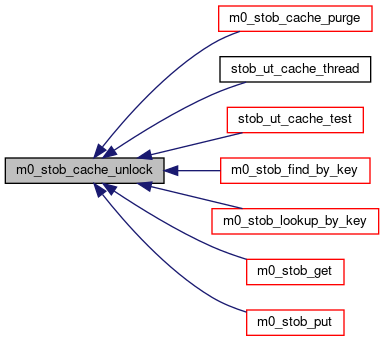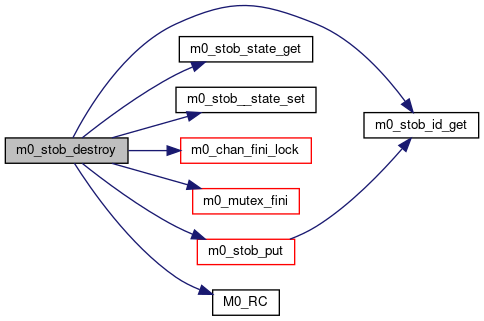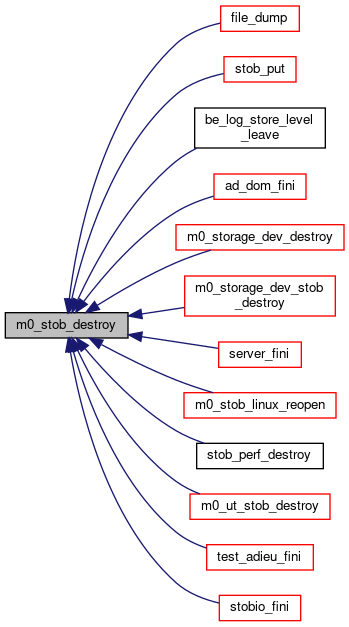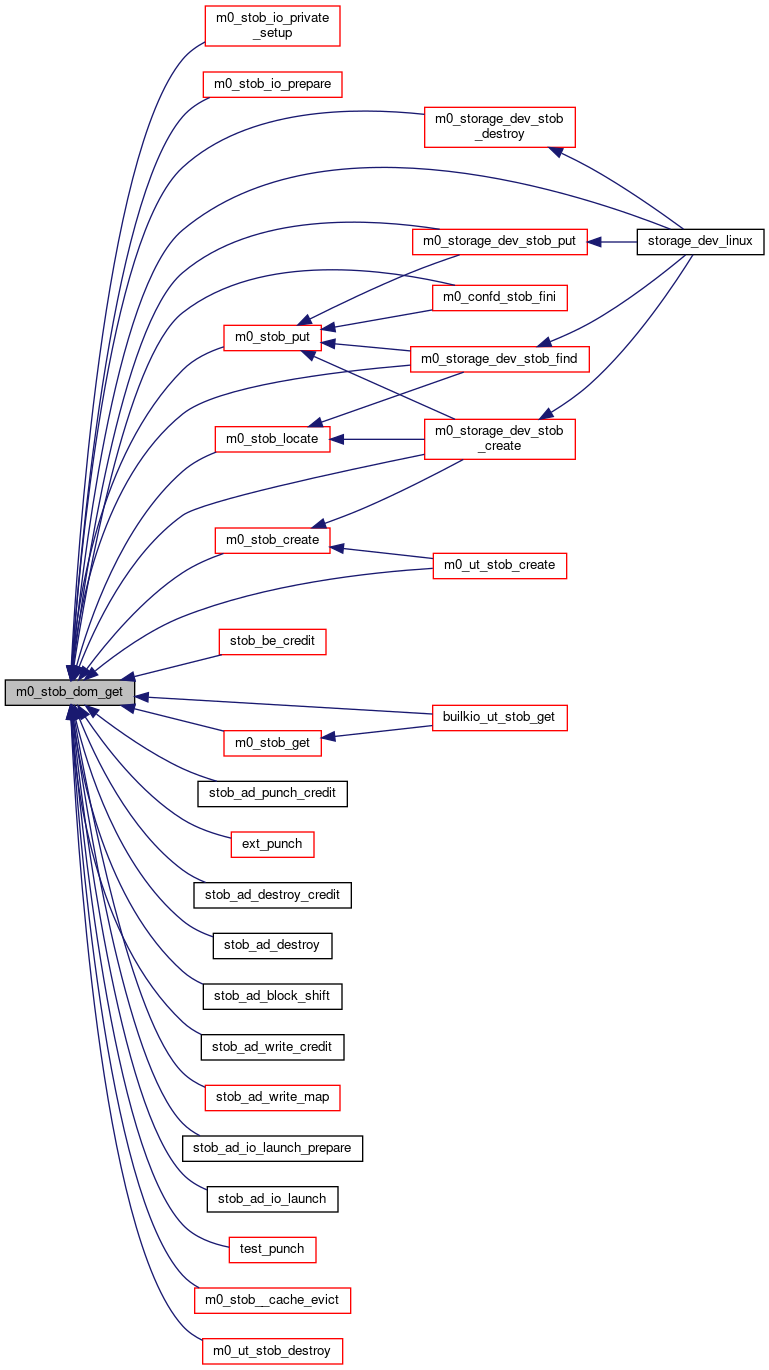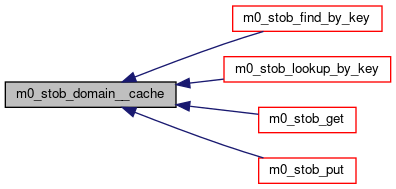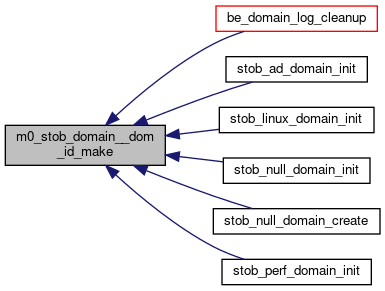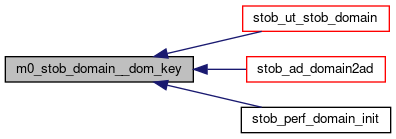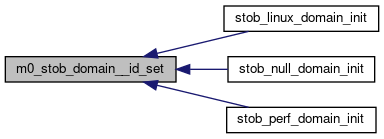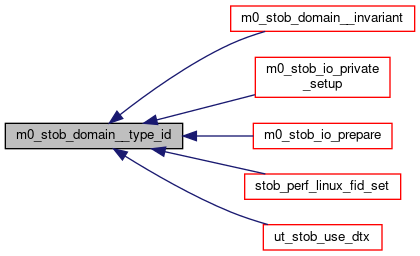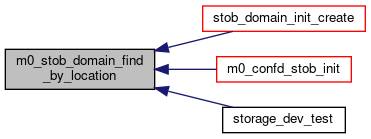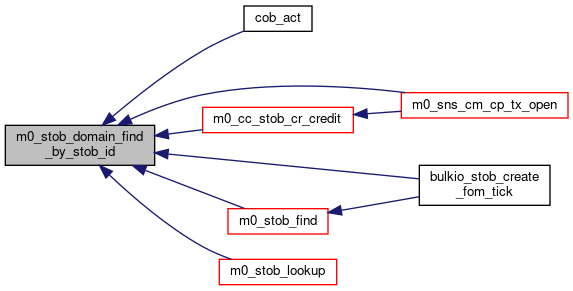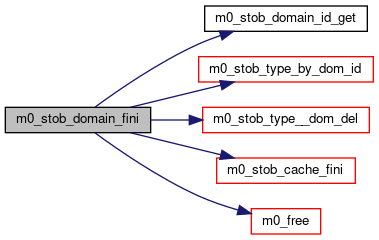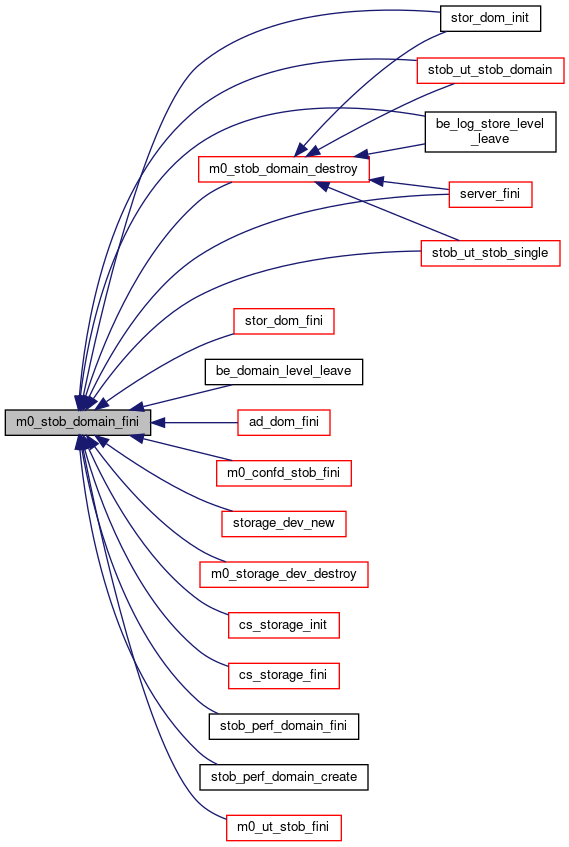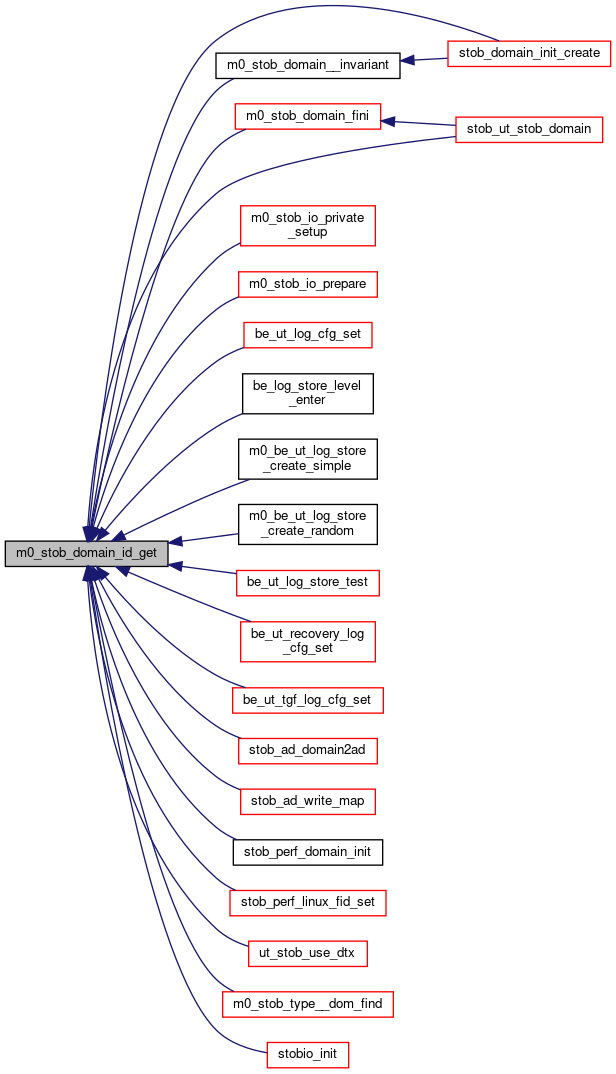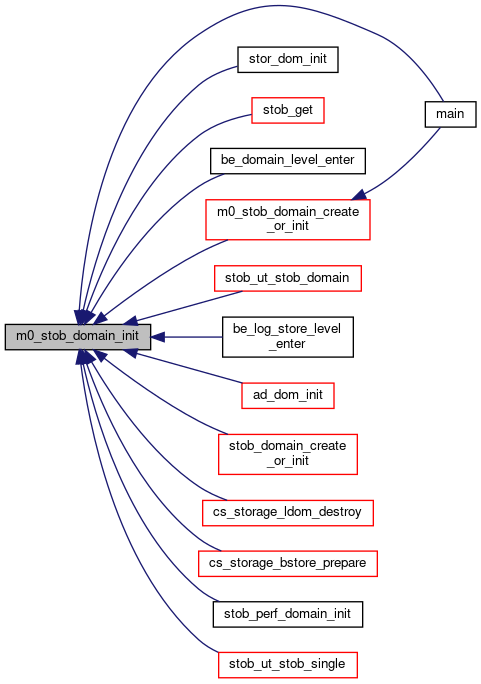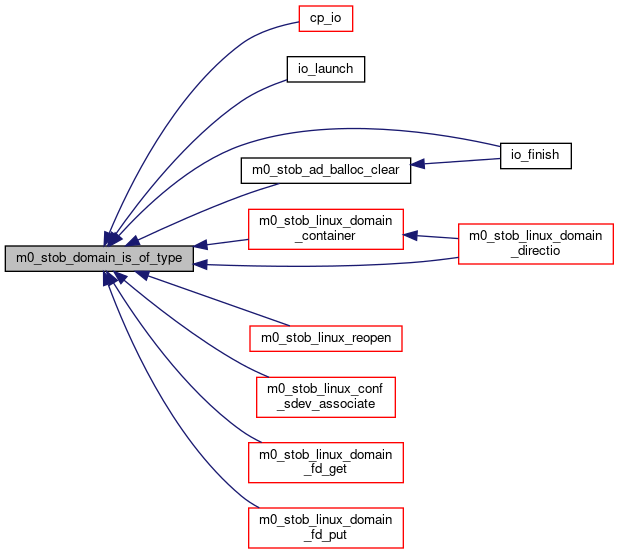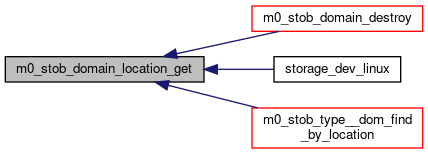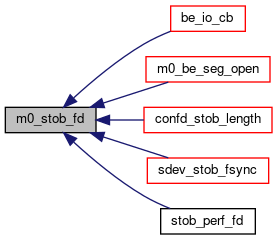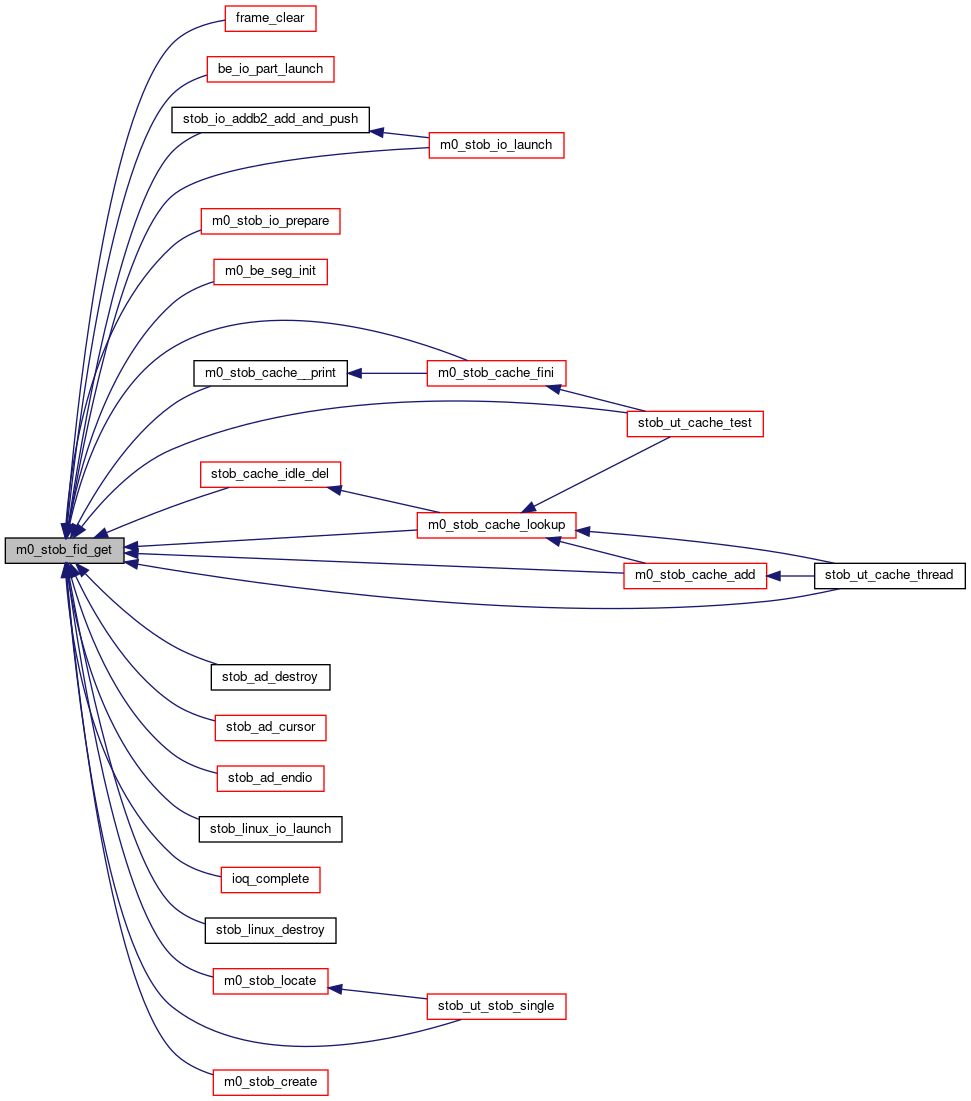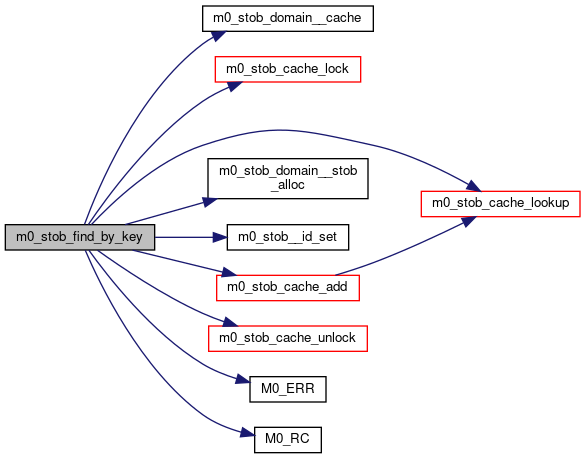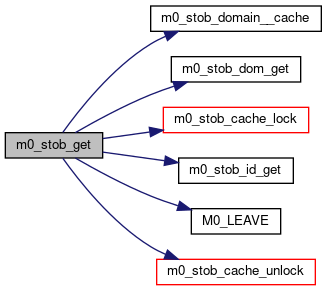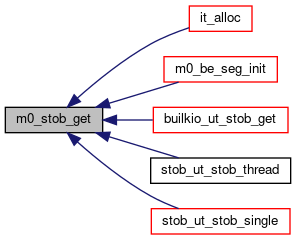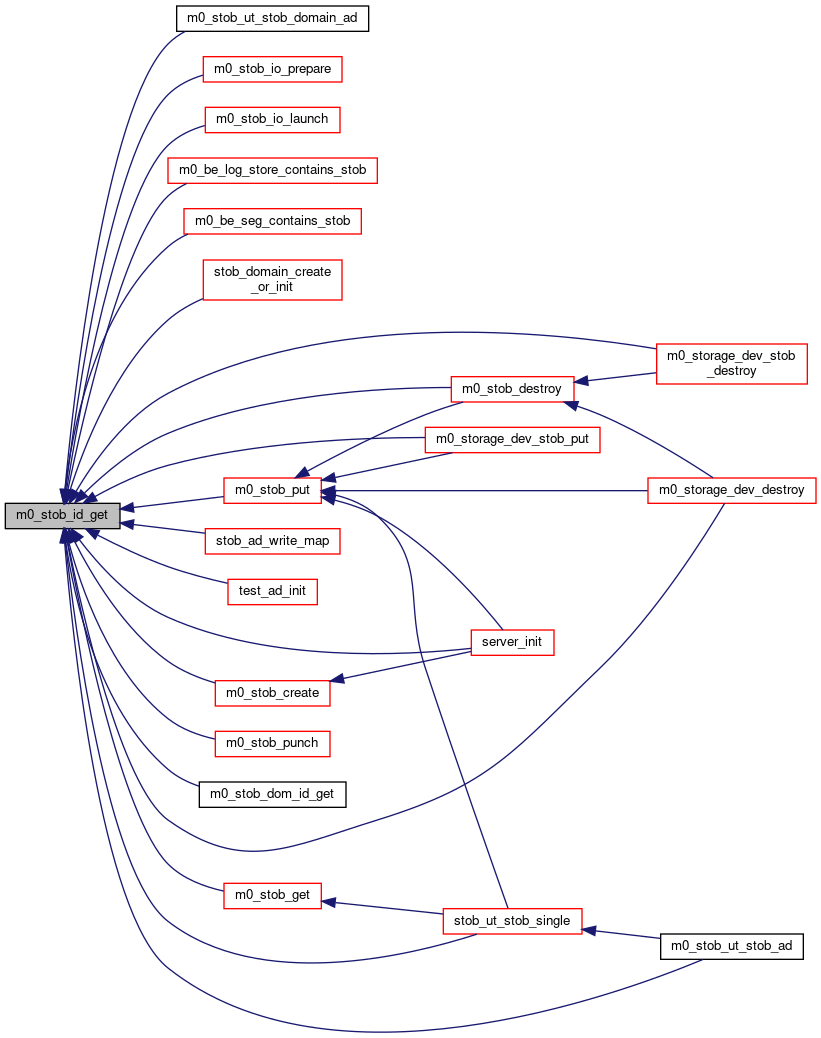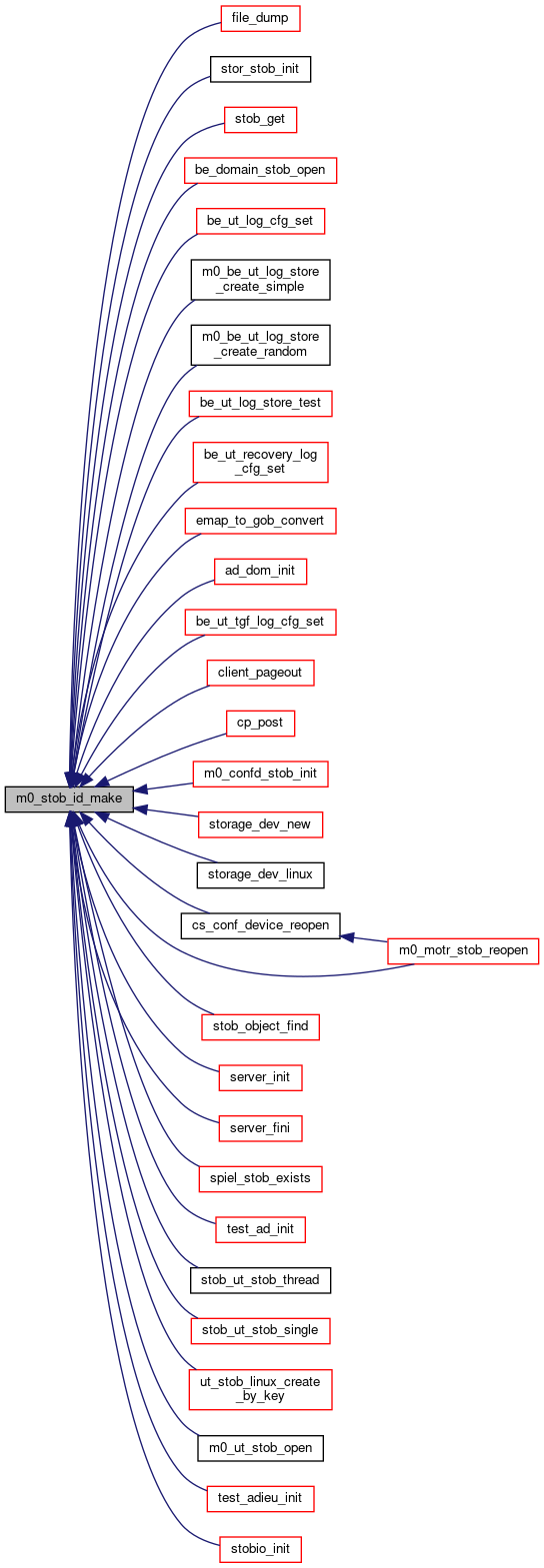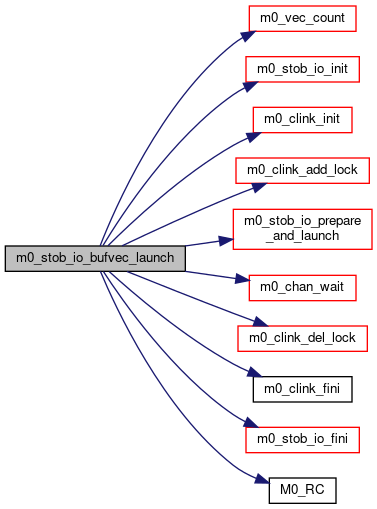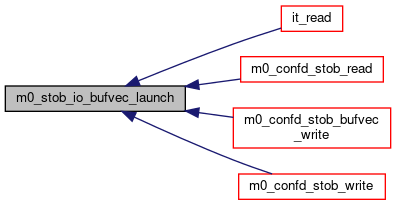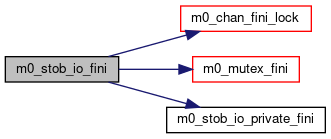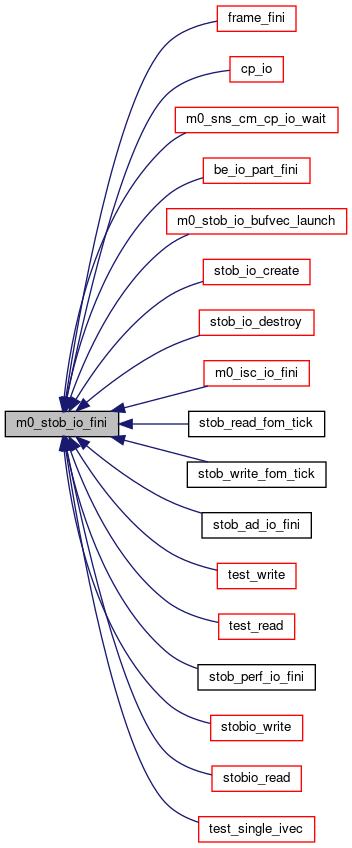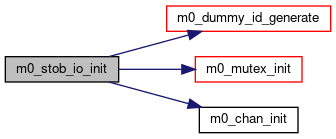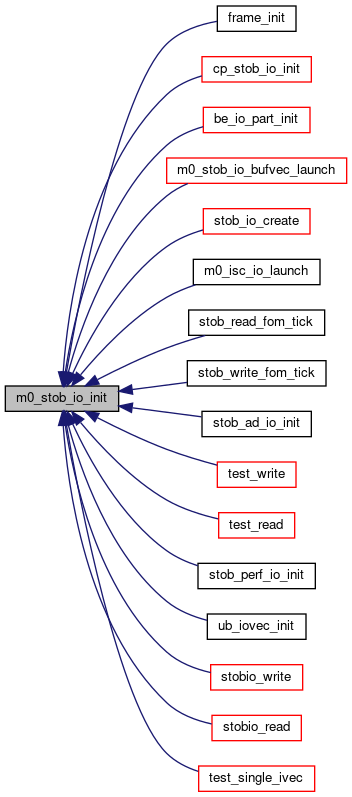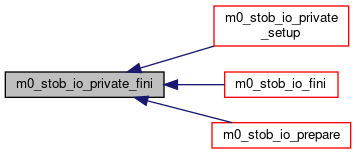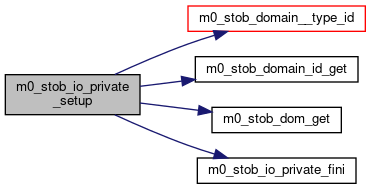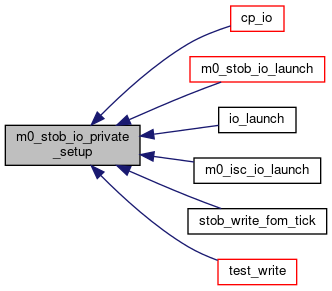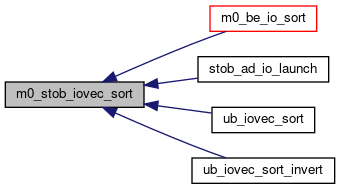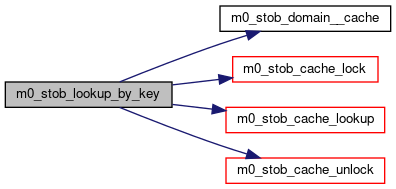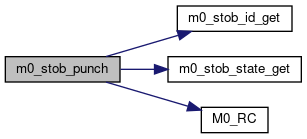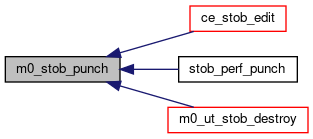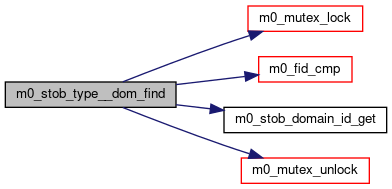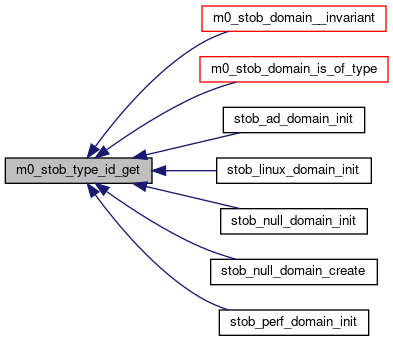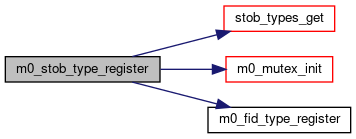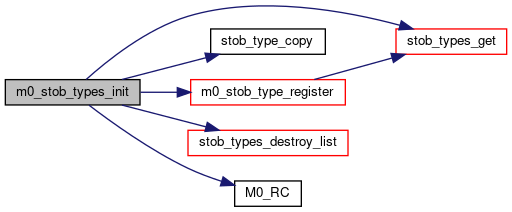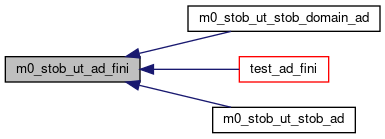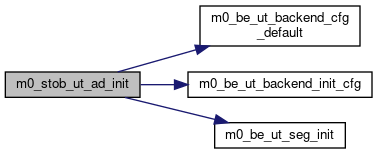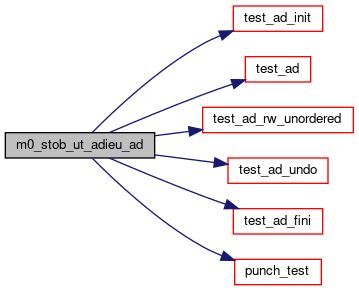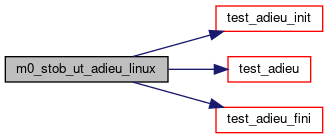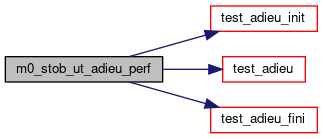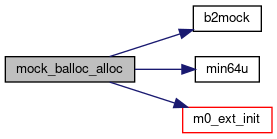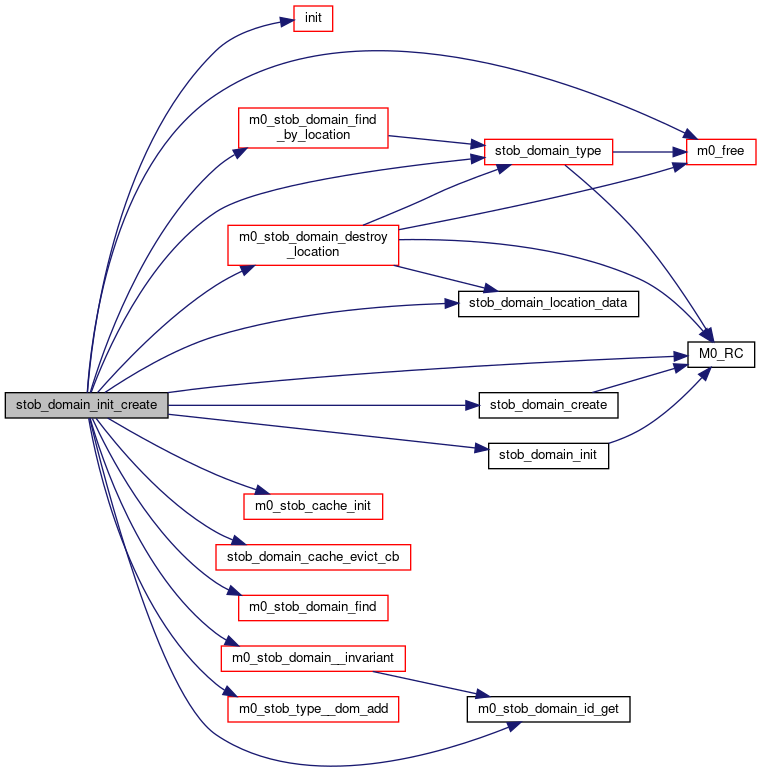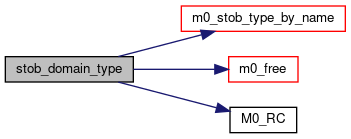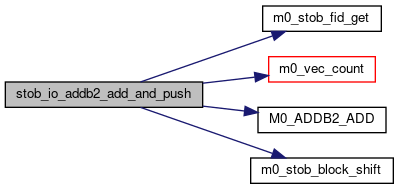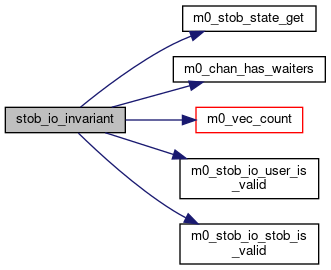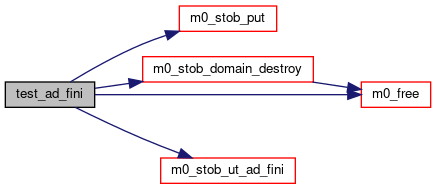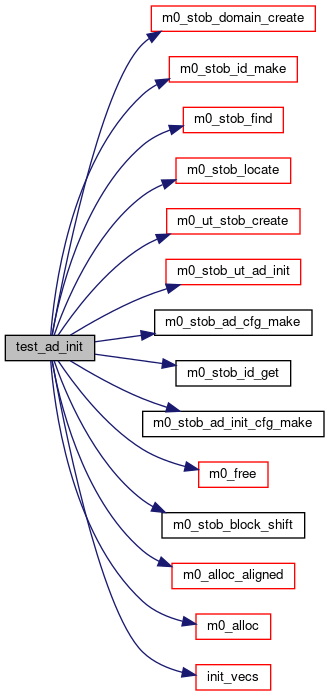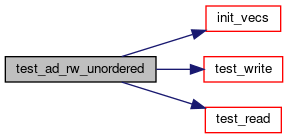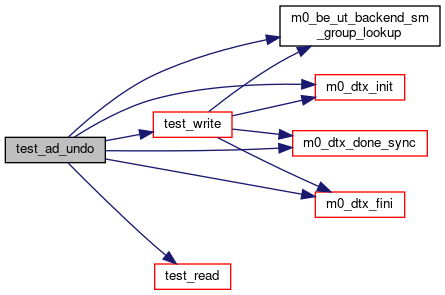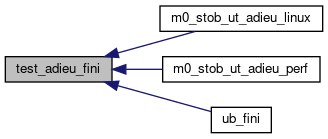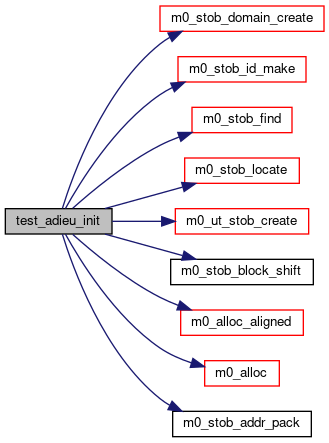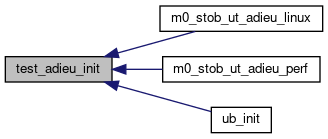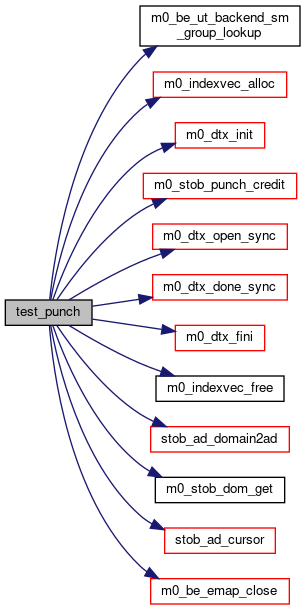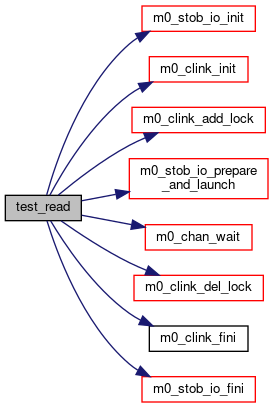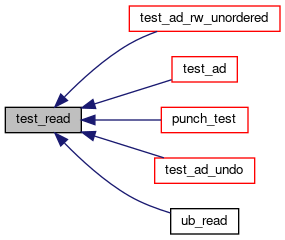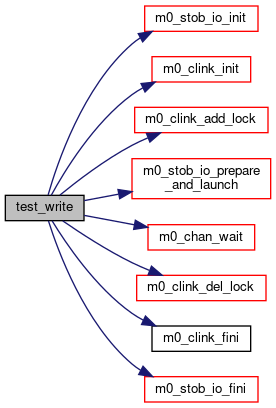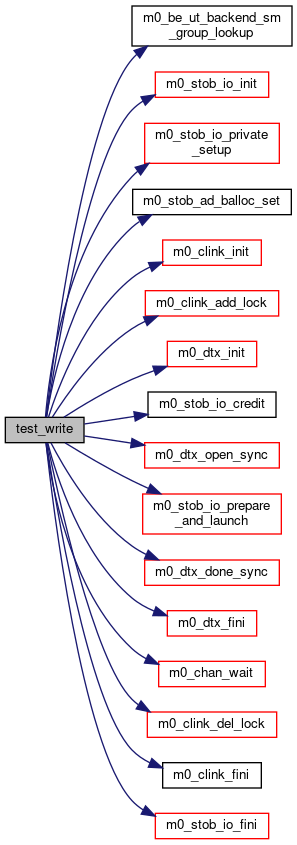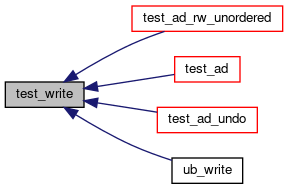Data Structures | |
| struct | m0_stob_cache |
| struct | m0_stob_domain |
| struct | m0_stob_domain_ops |
| struct | m0_stob_io |
| struct | m0_stob_io_op |
| struct | m0_stob_ioq_error |
| struct | m0_stob_module |
| struct | m0_stob_ad_module |
| struct | m0_stob_id |
| struct | m0_stob |
| struct | m0_stob_ops |
| struct | m0_stob_types |
| struct | m0_stob_type |
| struct | m0_stob_type_ops |
| struct | mock_balloc |
Macros | |
| #define | STOB_ID_F "{" FID_F "," FID_F "}" |
| #define | STOB_ID_P(si) FID_P(&(si)->si_domain_fid), FID_P(&(si)->si_fid) |
| #define | AD_CS_SZ 16 |
| #define | AD_ADIEU_CS_SZ 16 |
Typedefs | |
| typedef void(* | m0_stob_cache_eviction_cb_t) (struct m0_stob_cache *cache, struct m0_stob *stob) |
Functions | |
| M0_INTERNAL int | m0_stob_cache_init (struct m0_stob_cache *cache, uint64_t idle_size, m0_stob_cache_eviction_cb_t eviction_cb) |
| M0_INTERNAL void | m0_stob_cache_fini (struct m0_stob_cache *cache) |
| M0_INTERNAL bool | m0_stob_cache__invariant (const struct m0_stob_cache *cache) |
| M0_INTERNAL void | m0_stob_cache_add (struct m0_stob_cache *cache, struct m0_stob *stob) |
| M0_INTERNAL void | m0_stob_cache_idle (struct m0_stob_cache *cache, struct m0_stob *stob) |
| M0_INTERNAL struct m0_stob * | m0_stob_cache_lookup (struct m0_stob_cache *cache, const struct m0_fid *stob_fid) |
| M0_INTERNAL void | m0_stob_cache_purge (struct m0_stob_cache *cache, int nr) |
| M0_INTERNAL void | m0_stob_cache_lock (struct m0_stob_cache *cache) |
| M0_INTERNAL void | m0_stob_cache_unlock (struct m0_stob_cache *cache) |
| M0_INTERNAL bool | m0_stob_cache_is_locked (const struct m0_stob_cache *cache) |
| M0_INTERNAL bool | m0_stob_cache_is_not_locked (const struct m0_stob_cache *cache) |
| M0_INTERNAL void | m0_stob_cache__print (struct m0_stob_cache *cache) |
| static int | stob_domain_type (const char *location, struct m0_stob_type **type) |
| static char * | stob_domain_location_data (const char *location) |
| static void | stob_domain_cache_evict_cb (struct m0_stob_cache *cache, struct m0_stob *stob) |
| static int | stob_domain_create (struct m0_stob_type *type, const char *location_data, uint64_t dom_key, const char *str_cfg_create) |
| static int | stob_domain_init (struct m0_stob_type *type, const char *location_data, const char *str_cfg_init, struct m0_stob_domain **out) |
| static int | stob_domain_init_create (const char *location, const char *str_cfg_init, uint64_t dom_key, const char *str_cfg_create, struct m0_stob_domain **out, bool init) |
| M0_INTERNAL int | m0_stob_domain_init (const char *location, const char *str_cfg_init, struct m0_stob_domain **out) |
| M0_INTERNAL void | m0_stob_domain_fini (struct m0_stob_domain *dom) |
| M0_INTERNAL int | m0_stob_domain_create (const char *location, const char *str_cfg_init, uint64_t dom_key, const char *str_cfg_create, struct m0_stob_domain **out) |
| M0_INTERNAL int | m0_stob_domain_destroy (struct m0_stob_domain *dom) |
| M0_INTERNAL int | m0_stob_domain_destroy_location (const char *location) |
| M0_INTERNAL int | m0_stob_domain_create_or_init (const char *location, const char *str_cfg_init, uint64_t dom_key, const char *str_cfg_create, struct m0_stob_domain **out) |
| M0_INTERNAL struct m0_stob_domain * | m0_stob_domain_find (const struct m0_fid *dom_id) |
| M0_INTERNAL struct m0_stob_domain * | m0_stob_domain_find_by_location (const char *location) |
| M0_INTERNAL struct m0_stob_domain * | m0_stob_domain_find_by_stob_id (const struct m0_stob_id *stob_id) |
| M0_INTERNAL const struct m0_fid * | m0_stob_domain_id_get (const struct m0_stob_domain *dom) |
| M0_INTERNAL const char * | m0_stob_domain_location_get (const struct m0_stob_domain *dom) |
| M0_INTERNAL void | m0_stob_domain__id_set (struct m0_stob_domain *dom, struct m0_fid *dom_id) |
| M0_INTERNAL uint8_t | m0_stob_domain__type_id (const struct m0_fid *dom_id) |
| M0_INTERNAL uint64_t | m0_stob_domain__dom_key (const struct m0_fid *dom_id) |
| M0_INTERNAL void | m0_stob_domain__dom_id_make (struct m0_fid *dom_id, uint8_t type_id, uint64_t dom_container, uint64_t dom_key) |
| M0_INTERNAL bool | m0_stob_domain__invariant (struct m0_stob_domain *dom) |
| M0_INTERNAL bool | m0_stob_domain__dom_key_is_valid (uint64_t dom_key) |
| M0_INTERNAL bool | m0_stob_domain_is_of_type (const struct m0_stob_domain *dom, const struct m0_stob_type *dt) |
| M0_INTERNAL struct m0_stob_cache * | m0_stob_domain__cache (struct m0_stob_domain *dom) |
| M0_INTERNAL struct m0_stob * | m0_stob_domain__stob_alloc (struct m0_stob_domain *dom, const struct m0_fid *stob_fid) |
| M0_INTERNAL void | m0_stob_domain__stob_free (struct m0_stob_domain *dom, struct m0_stob *stob) |
| static void | m0_stob_io_private_fini (struct m0_stob_io *io) |
| static void | stob_io_addb2_add_and_push (uint64_t id, struct m0_stob_io *io, struct m0_stob *obj) |
| static bool | stob_io_invariant (struct m0_stob_io *io, struct m0_stob *obj, enum m0_stob_io_state state) |
| static void | stob_io_fill (struct m0_stob_io *io, struct m0_stob *obj, struct m0_dtx *tx, struct m0_io_scope *scope, enum m0_stob_io_state state, bool count_update) |
| struct m0_stob_ioq_error | M0_XCA_DOMAIN (rpc) |
| M0_INTERNAL struct m0_stob_module * | m0_stob_module__get (void) |
| M0_INTERNAL int | m0_stob_find_by_key (struct m0_stob_domain *dom, const struct m0_fid *stob_fid, struct m0_stob **out) |
| M0_INTERNAL int | m0_stob_find (const struct m0_stob_id *id, struct m0_stob **out) |
| M0_INTERNAL int | m0_stob_lookup_by_key (struct m0_stob_domain *dom, const struct m0_fid *stob_fid, struct m0_stob **out) |
| M0_INTERNAL int | m0_stob_lookup (const struct m0_stob_id *id, struct m0_stob **out) |
| M0_INTERNAL int | m0_stob_locate (struct m0_stob *stob) |
| M0_INTERNAL void | m0_stob_create_credit (struct m0_stob_domain *dom, struct m0_be_tx_credit *accum) |
| M0_INTERNAL int | m0_stob_create (struct m0_stob *stob, struct m0_dtx *dtx, const char *str_cfg) |
| M0_INTERNAL void | m0_stob_destroy_credit (struct m0_stob *stob, struct m0_be_tx_credit *accum) |
| M0_INTERNAL void | m0_stob_delete_mark (struct m0_stob *stob) |
| M0_INTERNAL int | m0_stob_destroy (struct m0_stob *stob, struct m0_dtx *dtx) |
| M0_INTERNAL int | m0_stob_punch_credit (struct m0_stob *stob, struct m0_indexvec *want, struct m0_indexvec *got, struct m0_be_tx_credit *accum) |
| M0_INTERNAL int | m0_stob_punch (struct m0_stob *stob, struct m0_indexvec *range, struct m0_dtx *dtx) |
| M0_INTERNAL uint64_t | m0_stob_dom_id_get (struct m0_stob *stob) |
| M0_INTERNAL const struct m0_stob_id * | m0_stob_id_get (struct m0_stob *stob) |
| M0_INTERNAL const struct m0_fid * | m0_stob_fid_get (struct m0_stob *stob) |
| M0_INTERNAL uint64_t | m0_stob_id_dom_id_get (const struct m0_stob_id *stob_id) |
| M0_INTERNAL enum m0_stob_state | m0_stob_state_get (struct m0_stob *stob) |
| M0_INTERNAL uint32_t | m0_stob_block_shift (struct m0_stob *stob) |
| M0_INTERNAL void | m0_stob_get (struct m0_stob *stob) |
| M0_INTERNAL void | m0_stob_put (struct m0_stob *stob) |
| M0_INTERNAL void | m0_stob__id_set (struct m0_stob *stob, const struct m0_fid *stob_fid) |
| M0_INTERNAL void | m0_stob__cache_evict (struct m0_stob *stob) |
| M0_INTERNAL void | m0_stob__state_set (struct m0_stob *stob, enum m0_stob_state state) |
| M0_INTERNAL struct m0_stob_domain * | m0_stob_dom_get (struct m0_stob *stob) |
| M0_INTERNAL void | m0_stob_id_make (uint64_t container, uint64_t key, const struct m0_fid *dom_id, struct m0_stob_id *stob_id) |
| M0_INTERNAL bool | m0_stob_id_eq (const struct m0_stob_id *stob_id0, const struct m0_stob_id *stob_id1) |
| M0_INTERNAL int | m0_stob_fd (struct m0_stob *stob) |
| M0_INTERNAL int | m0_stob_mod_init (void) |
| M0_INTERNAL void | m0_stob_mod_fini (void) |
| struct m0_stob_id | M0_XCA_DOMAIN (be|rpc) |
| M0_TL_DESCR_DEFINE (domains, "stob domains", static, struct m0_stob_domain, sd_domain_linkage, sd_magic, M0_STOB_DOMAINS_MAGIC, M0_STOB_DOMAINS_HEAD_MAGIC) | |
| M0_TL_DEFINE (domains, static, struct m0_stob_domain) | |
| M0_TL_DESCR_DEFINE (types, "stob types", static, struct m0_stob_type, st_type_linkage, st_magic, M0_STOB_TYPES_MAGIC, M0_STOB_TYPES_HEAD_MAGIC) | |
| M0_TL_DEFINE (types, static, struct m0_stob_type) | |
| static int | stob_type_copy (const struct m0_stob_type *type, struct m0_stob_type **copy) |
| static void | stob_types_destroy_list (struct m0_stob_types *types) |
| static struct m0_stob_types * | stob_types_get (void) |
| M0_INTERNAL int | m0_stob_types_init (void) |
| M0_INTERNAL void | m0_stob_types_fini (void) |
| M0_INTERNAL struct m0_stob_type * | m0_stob_type_by_dom_id (const struct m0_fid *id) |
| M0_INTERNAL struct m0_stob_type * | m0_stob_type_by_name (const char *name) |
| M0_INTERNAL uint8_t | m0_stob_type_id_by_name (const char *name) |
| M0_INTERNAL void | m0_stob_type_register (struct m0_stob_type *type) |
| M0_INTERNAL void | m0_stob_type_deregister (struct m0_stob_type *type) |
| M0_INTERNAL uint8_t | m0_stob_type_id_get (const struct m0_stob_type *type) |
| M0_INTERNAL const char * | m0_stob_type_name_get (struct m0_stob_type *type) |
| M0_INTERNAL void | m0_stob_type__dom_add (struct m0_stob_type *type, struct m0_stob_domain *dom) |
| M0_INTERNAL void | m0_stob_type__dom_del (struct m0_stob_type *type, struct m0_stob_domain *dom) |
| M0_INTERNAL struct m0_stob_domain * | m0_stob_type__dom_find (struct m0_stob_type *type, const struct m0_fid *dom_id) |
| M0_INTERNAL struct m0_stob_domain * | m0_stob_type__dom_find_by_location (struct m0_stob_type *type, const char *location) |
| void | m0_stob_ut_ad_init (struct m0_be_ut_backend *ut_be, struct m0_be_ut_seg *ut_seg, bool use_small_credits) |
| void | m0_stob_ut_ad_fini (struct m0_be_ut_backend *ut_be, struct m0_be_ut_seg *ut_seg) |
| static struct mock_balloc * | b2mock (struct m0_ad_balloc *ballroom) |
| static int | mock_balloc_init (struct m0_ad_balloc *ballroom, struct m0_be_seg *seg, uint32_t bshift, m0_bindex_t container_size, m0_bcount_t groupsize, m0_bcount_t spare_reserve) |
| static void | mock_balloc_fini (struct m0_ad_balloc *ballroom) |
| static int | mock_balloc_alloc (struct m0_ad_balloc *ballroom, struct m0_dtx *dtx, m0_bcount_t count, struct m0_ext *out, uint64_t alloc_type) |
| static int | mock_balloc_free (struct m0_ad_balloc *ballroom, struct m0_dtx *dtx, struct m0_ext *ext) |
| static int | malloc_reserve_extent (struct m0_ad_balloc *ballroom, struct m0_be_tx *tx, struct m0_ext *ext, uint64_t alloc_zone) |
| static void | init_vecs () |
| static int | test_ad_init (bool use_small_credits) |
| static int | test_ad_fini (void) |
| static void | test_write (int nr, struct m0_dtx *tx) |
| static void | test_read (int nr) |
| static void | test_punch (int nr) |
| static void | test_ad_rw_unordered () |
| static void | test_ad (void) |
| static void | punch_test (void) |
| static void | test_ad_undo (void) |
| void | m0_stob_ut_adieu_ad (void) |
| static void | ub_write (int i) |
| static void | ub_read (int i) |
| static int | ub_init (const char *opts M0_UNUSED) |
| static void | ub_fini (void) |
| static int | test_adieu_init (const char *location, const char *dom_cfg, const char *stob_cfg) |
| static void | test_adieu_fini (void) |
| static void | test_write (int i) |
| static void | test_adieu (const char *path) |
| void | m0_stob_ut_adieu_linux (void) |
| void | m0_stob_ut_adieu_perf (void) |
| static void | ub_iovec_init () |
| static void | ub_iovec_invert () |
| static void | ub_iovec_sort () |
| static void | ub_iovec_sort_invert () |
adieu | |
Asynchronous Direct Io Extensible User interface (adieu) for storage objects. Overview. adieu is an interface for a non-blocking (asynchronous) 0-copy (direct) vectored IO against storage objects. A user of this interface builds an IO operation description and queues it against a storage object. IO completion or failure notification is done by signalling a user supplied m0_chan. As usual, the user can either wait on the chan or register a call-back with it. adieu supports scatter-gather type of IO operations (that is, vectored on both input and output data). adieu can work both on local and remote storage objects. adieu IO operations are executed as part of a distributed transaction. Functional specification. Externally, adieu usage has the following phases: - m0_bufvec registration. Some types of storage objects require that buffers from which IO is done are registered with its IO sub-system (examples: RDMA). This step is optional, IO from unregistered buffers should also be possible (albeit might incur additional data-copy). - IO description creation. A IO operation description object m0_stob_io is initialised. - IO operation is queued by a call to m0_stob_io_launch(). It is guaranteed that on a successful return from this call, a chan embedded into IO operation data-structure will be eventually signalled. - An execution of a queued IO operation can be delayed for some time due to storage traffic control regulations, concurrency control, resource quotas or barriers. - An IO operation is executed, possibly by splitting it into implementation defined fragments. A user can request an "prefixed fragments execution" mode (m0_stob_io_flags::SIF_PREFIX) constraining execution concurrency as to guarantee that after execution completion (with success or failure) a storage is updated as if some possibly empty prefix of the IO operation executed successfully (this is similar to the failure mode of POSIX write call). When prefixed fragments execution mode is not requested, an implementation is free to execute fragments in any order and with any degree of concurrency. Prefixed fragments execution mode request has no effect on read-only IO operations. - When whole operation execution completes, a chan embedded into IO operation data-structure is signalled. It is guaranteed that no IO is outstanding at this moment and that adieu implementation won't touch either IO operation structure or associated data pages afterward. - After analyzing IO result codes, a user is free to either de-allocate IO operation structure by calling m0_stob_io_fini() or use it to queue another IO operation potentially against different object. Ordering and barriers. The only guarantee about relative order of IO operations state transitions is that execution of any updating operation submitted before m0_stob_io_opcode::SIO_BARRIER operation completes before any updating operation submitted after the barrier starts executing. For the purpose of this definition, an updating operation is an operation of any valid type different from SIO_READ (i.e., barriers are updating operations). A barrier operation completes when all operations submitted before it (including other barrier operations) complete.
IO alignment and granularity. Alignment is not "optimal IO size". This is a requirement rather than hint. Block sizes are needed for the following reasons: - to insulate stob IO layer from read-modify-write details; - to allow IO to the portions of objects inaccessible through the flat 64-bit byte-granularity name-space.
Result codes. In addition to filling in data pages with the data (in a case read operation), adieu supplies two status codes on IO completion: - <tt>m0_stob_io::si_rc</tt> is a return code of IO operation. 0 means success, any other possible value is negated errno; - <tt>m0_stob_io::si_count</tt> is a number of blocks (as defined by m0_stob_op::sop_block_shift()) successfully transferred between data pages and the storage object. When IO is executed in prefixed fragments mode, exactly <tt>m0_stob_io::si_count</tt> blocks of the storage object, starting from the offset <tt>m0_stob_io::si_stob.ov_index[0]</tt> were transferred. Data ownership. Data pages are owned by adieu implementation from the moment of call to m0_stob_io_launch() until the chan is signalled. adieu users must not inspect or modify data during that time. An implementation is free to modify the data temporarily, un-map pages, etc. An implementation must not touch the data at any other time. Liveness rules. m0_stob_io can be freed once it is owned by an adieu user (see data ownership). It has no explicit reference counting, a user must add its own should m0_stob_io be shared between multiple threads. The user must guarantee that the target storage object is pinned in memory while IO operation is owned by the implementation. An implementation is free to touch storage object while IO is in progress. Similarly, the user must pin the transaction and IO scope while m0_stob_io is owned by the implementation. Concurrency. When m0_stob_io is owned by a user, the user is responsible for concurrency control. Implementation guarantees that synchronous channel notification (through clink call-back) happens in the context not holding IO lock. At the moment there are two types of storage object supporting adieu: - Linux file system based one, using Linux libaio interfaces; - AD stob type implements adieu on top of underlying backing store storage object. State. (O)(X)
| ^
| |
m0_stob_io_init() | | m0_stob_io_fini()
| |
V |
SIS_IDLE
| ^
| |
m0_stob_io_launch() | | IO completion
| |
V |
SIS_BUSY
| |
| enum | m0_stob_io_opcode { SIO_INVALID, SIO_READ, SIO_WRITE, SIO_BARRIER, SIO_SYNC } |
| enum | m0_stob_io_state { SIS_ZERO = 0, SIS_IDLE, SIS_PREPARED, SIS_BUSY } |
| enum | m0_stob_io_flags { SIF_PREFIX = (1 << 0), SIF_NOHOLE = (1 << 1) } |
| M0_INTERNAL int | m0_stob_io_private_setup (struct m0_stob_io *io, struct m0_stob *obj) |
| M0_INTERNAL void | m0_stob_io_init (struct m0_stob_io *io) |
| M0_INTERNAL void | m0_stob_io_fini (struct m0_stob_io *io) |
| M0_INTERNAL void | m0_stob_io_credit (const struct m0_stob_io *io, const struct m0_stob_domain *dom, struct m0_be_tx_credit *accum) |
| M0_INTERNAL int | m0_stob_io_prepare (struct m0_stob_io *io, struct m0_stob *obj, struct m0_dtx *tx, struct m0_io_scope *scope) |
| M0_INTERNAL int | m0_stob_io_launch (struct m0_stob_io *io, struct m0_stob *obj, struct m0_dtx *tx, struct m0_io_scope *scope) |
| M0_INTERNAL int | m0_stob_io_prepare_and_launch (struct m0_stob_io *io, struct m0_stob *obj, struct m0_dtx *tx, struct m0_io_scope *scope) |
| M0_INTERNAL bool | m0_stob_io_user_is_valid (const struct m0_bufvec *user) |
| M0_INTERNAL bool | m0_stob_io_stob_is_valid (const struct m0_indexvec *stob) |
| M0_INTERNAL int | m0_stob_io_bufvec_launch (struct m0_stob *stob, struct m0_bufvec *bufvec, int op_code, m0_bindex_t offset) |
| M0_INTERNAL void * | m0_stob_addr_pack (const void *buf, uint32_t shift) |
| M0_INTERNAL void * | m0_stob_addr_open (const void *buf, uint32_t shift) |
| M0_INTERNAL void | m0_stob_iovec_sort (struct m0_stob_io *stob) |
Detailed Description
- Todo:
- more scalable object index instead of a list.
Storage object is a fundamental abstraction of M0. Storage objects offer a linear address space for data and may have redundancy and may have integrity data.
There are multiple types of storage objects, used for various purposes and providing various extensions of the basic storage object interface described below. Specifically, containers for data and meta-data are implemented as special types of storage objects.
Macro Definition Documentation
◆ AD_ADIEU_CS_SZ
◆ AD_CS_SZ
◆ STOB_ID_F
◆ STOB_ID_P
Typedef Documentation
◆ m0_stob_cache_eviction_cb_t
| typedef void(* m0_stob_cache_eviction_cb_t) (struct m0_stob_cache *cache, struct m0_stob *stob) |
Enumeration Type Documentation
◆ anonymous enum
| anonymous enum |
◆ anonymous enum
| anonymous enum |
Levels of m0_stob_module::stm_module.
| Enumerator | |
|---|---|
| M0_LEVEL_STOB | m0_stob_types_init() has been called. |
◆ anonymous enum
| anonymous enum |
◆ anonymous enum
◆ anonymous enum
| anonymous enum |
◆ anonymous enum
| anonymous enum |
◆ anonymous enum
◆ m0_addb2_stio_req_labels
◆ m0_avi_stob_io_labels
◆ m0_stob_io_flags
| enum m0_stob_io_flags |
Flags controlling the execution of IO operation.
| Enumerator | |
|---|---|
| SIF_PREFIX | Execute operation in "prefixed fragments" mode. It is called "prefixed" because in this mode it is guaranteed that some initial part of the operation is executed. For example, when writing N blocks at offset X, it is guaranteed that when operation completes, blocks in the extent [X, X+M] are written to. When operation completed successfully, M == N, otherwise, M might be less than N. That is, here "prefix" means the same as in "string prefix" (http://en.wikipedia.org/wiki/Prefix_(computer_science) ), because [X, X+M] is a prefix of [X, X+N] when M <= N. |
| SIF_NOHOLE | Read operation should not see any holes. If a hole is met during read, return error instead. |
◆ m0_stob_io_opcode
| enum m0_stob_io_opcode |
◆ m0_stob_io_state
| enum m0_stob_io_state |
State of adieu IO operation.
| Enumerator | |
|---|---|
| SIS_ZERO | State used to detect un-initialised m0_stob_io. |
| SIS_IDLE | User owns m0_stob_io and data pages. No IO is ongoing. |
| SIS_PREPARED | Operation has been queued for execution by a call to m0_stob_io_prepare(). |
| SIS_BUSY | Operation has been queued for execution by a call to m0_stob_io_launch(), but hasn't yet been completed. adieu owns m0_stob_io and data pages. |
◆ m0_stob_state
| enum m0_stob_state |
m0_stob state specifying its relationship with the underlying storage object.
- Todo:
- add M0_ prefix.
| Enumerator | |
|---|---|
| CSS_UNKNOWN | The state or existence of the underlying storage object are not known. m0_stob can be used as a placeholder in storage object identifiers name-space in this state. |
| CSS_EXISTS | The underlying storage object is known to exist. |
| CSS_NOENT | The underlying storage object is known to not exist. |
| CSS_DELETE | The underlying storage object has been requested to be deleted. |
Function Documentation
◆ b2mock()
|
static |
◆ init_vecs()
|
static |
◆ m0_stob__cache_evict()
| M0_INTERNAL void m0_stob__cache_evict | ( | struct m0_stob * | stob | ) |
◆ m0_stob__id_set()
◆ m0_stob__state_set()
| M0_INTERNAL void m0_stob__state_set | ( | struct m0_stob * | stob, |
| enum m0_stob_state | state | ||
| ) |
◆ m0_stob_addr_open()
| M0_INTERNAL void * m0_stob_addr_open | ( | const void * | buf, |
| uint32_t | shift | ||
| ) |
Scales buffer address back from block-sized units.
- See also
- m0_stob_addr_pack()
Definition at line 302 of file io.c.
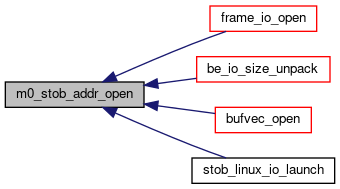
◆ m0_stob_addr_pack()
| M0_INTERNAL void * m0_stob_addr_pack | ( | const void * | buf, |
| uint32_t | shift | ||
| ) |
Scales buffer address into block-sized units.
- See also
- m0_stob_addr_open()
Definition at line 293 of file io.c.
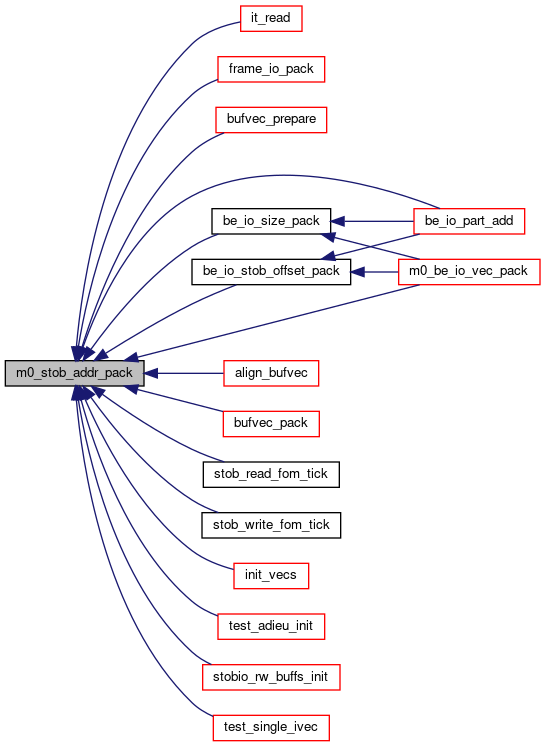
◆ m0_stob_block_shift()
| M0_INTERNAL uint32_t m0_stob_block_shift | ( | struct m0_stob * | stob | ) |
◆ m0_stob_cache__invariant()
| M0_INTERNAL bool m0_stob_cache__invariant | ( | const struct m0_stob_cache * | cache | ) |
◆ m0_stob_cache__print()
| M0_INTERNAL void m0_stob_cache__print | ( | struct m0_stob_cache * | cache | ) |
◆ m0_stob_cache_add()
| M0_INTERNAL void m0_stob_cache_add | ( | struct m0_stob_cache * | cache, |
| struct m0_stob * | stob | ||
| ) |
Adds stob to the stob cache. Stob should be deleted from the stob cache using m0_stob_cache_idle().
- Precondition
- m0_stob_cache_is_locked(cache)
- Postcondition
- m0_stob_cache_is_locked(cache)
Definition at line 120 of file cache.c.


◆ m0_stob_cache_fini()
| M0_INTERNAL void m0_stob_cache_fini | ( | struct m0_stob_cache * | cache | ) |
◆ m0_stob_cache_idle()
| M0_INTERNAL void m0_stob_cache_idle | ( | struct m0_stob_cache * | cache, |
| struct m0_stob * | stob | ||
| ) |
◆ m0_stob_cache_init()
| M0_INTERNAL int m0_stob_cache_init | ( | struct m0_stob_cache * | cache, |
| uint64_t | idle_size, | ||
| m0_stob_cache_eviction_cb_t | eviction_cb | ||
| ) |
◆ m0_stob_cache_is_locked()
| M0_INTERNAL bool m0_stob_cache_is_locked | ( | const struct m0_stob_cache * | cache | ) |
◆ m0_stob_cache_is_not_locked()
| M0_INTERNAL bool m0_stob_cache_is_not_locked | ( | const struct m0_stob_cache * | cache | ) |
◆ m0_stob_cache_lock()
| M0_INTERNAL void m0_stob_cache_lock | ( | struct m0_stob_cache * | cache | ) |
◆ m0_stob_cache_lookup()
| M0_INTERNAL struct m0_stob* m0_stob_cache_lookup | ( | struct m0_stob_cache * | cache, |
| const struct m0_fid * | stob_fid | ||
| ) |
Finds item in the stob cache. Stob found should be deleted from the stob cache using m0_stob_cache_idle().
- Precondition
- m0_stob_cache_is_locked(cache)
- Postcondition
- m0_stob_cache_is_locked(cache)
Definition at line 137 of file cache.c.
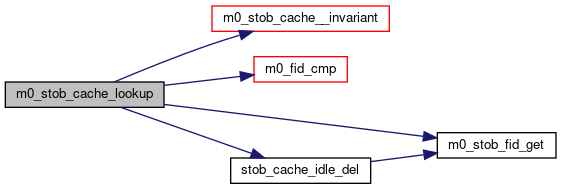
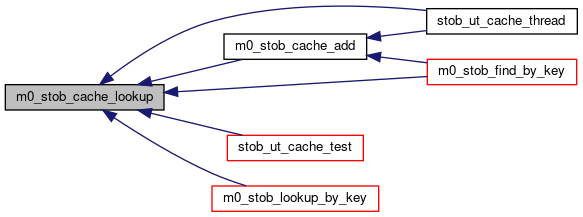
◆ m0_stob_cache_purge()
| M0_INTERNAL void m0_stob_cache_purge | ( | struct m0_stob_cache * | cache, |
| int | nr | ||
| ) |
◆ m0_stob_cache_unlock()
| M0_INTERNAL void m0_stob_cache_unlock | ( | struct m0_stob_cache * | cache | ) |
◆ m0_stob_create()
Creates a storate object.
- Parameters
-
stob Previously allocated in-memory object.
- Precondition
- stob->so_state != CSS_UNKNOWN
- stob->so_ref > 0
- Postcondition
- ergo(rc == 0, m0_stob_state_get(stob) == CSS_EXISTS))
Definition at line 154 of file stob.c.
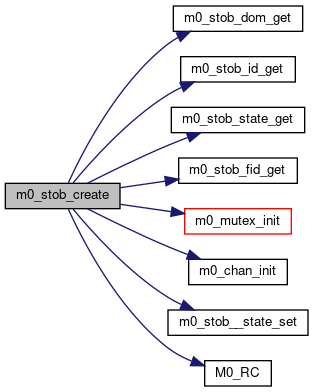
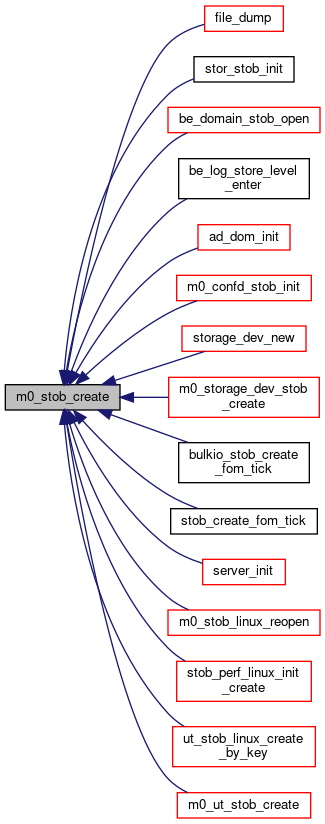
◆ m0_stob_create_credit()
| M0_INTERNAL void m0_stob_create_credit | ( | struct m0_stob_domain * | dom, |
| struct m0_be_tx_credit * | accum | ||
| ) |
Calculates BE tx credit for m0_stob_create().
Definition at line 148 of file stob.c.
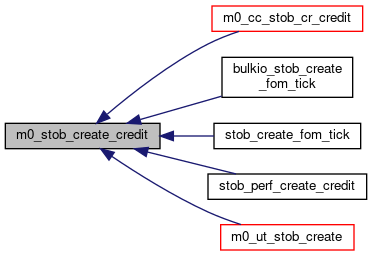
◆ m0_stob_delete_mark()
| M0_INTERNAL void m0_stob_delete_mark | ( | struct m0_stob * | stob | ) |
Marks stob state as CSS_DELETE to indicate that it has been requested to be deleted. Once a stob's state is marked as CSS_DELETE:
- If stob_ref > 1, the stob-delete FOM is made to wait on so_ref_chan channel
- This waiting channel is signalled when the stob_ref drops to 1, e.g. by SNS copy-machine FOM when it is done with the copy operation
- Copy-machine FOMs which may be created after 'stob-delete FOM is made to wait for so_ref drop to 1', exit right-away by releasing the so_ref
- The ongoing copy-machine FOMs proceed as usual
- Any copy-machine FOM when releases stob_ref, checks if the so_ref now is 1 and if there is any cob-delete FOM waiting on the so_ref_chan channel. If yes, it signals the so_ref_chan channel
Definition at line 193 of file stob.c.

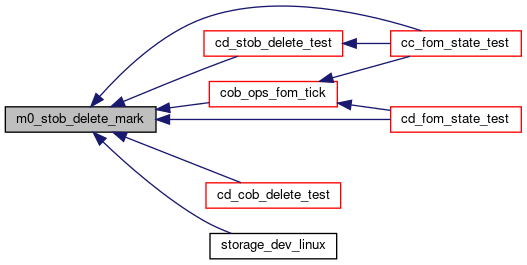
◆ m0_stob_destroy()
◆ m0_stob_destroy_credit()
| M0_INTERNAL void m0_stob_destroy_credit | ( | struct m0_stob * | stob, |
| struct m0_be_tx_credit * | accum | ||
| ) |
Calculates BE tx credit for m0_stob_destroy().
Definition at line 187 of file stob.c.
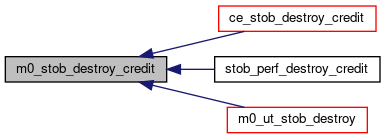
◆ m0_stob_dom_get()
| M0_INTERNAL struct m0_stob_domain * m0_stob_dom_get | ( | struct m0_stob * | stob | ) |
◆ m0_stob_dom_id_get()
| M0_INTERNAL uint64_t m0_stob_dom_id_get | ( | struct m0_stob * | stob | ) |
◆ m0_stob_domain__cache()
| M0_INTERNAL struct m0_stob_cache * m0_stob_domain__cache | ( | struct m0_stob_domain * | dom | ) |
◆ m0_stob_domain__dom_id_make()
| M0_INTERNAL void m0_stob_domain__dom_id_make | ( | struct m0_fid * | dom_id, |
| uint8_t | type_id, | ||
| uint64_t | dom_container, | ||
| uint64_t | dom_key | ||
| ) |
◆ m0_stob_domain__dom_key()
| M0_INTERNAL uint64_t m0_stob_domain__dom_key | ( | const struct m0_fid * | dom_id | ) |
◆ m0_stob_domain__dom_key_is_valid()
| M0_INTERNAL bool m0_stob_domain__dom_key_is_valid | ( | uint64_t | dom_key | ) |
◆ m0_stob_domain__id_set()
| M0_INTERNAL void m0_stob_domain__id_set | ( | struct m0_stob_domain * | dom, |
| struct m0_fid * | dom_id | ||
| ) |
◆ m0_stob_domain__invariant()
| M0_INTERNAL bool m0_stob_domain__invariant | ( | struct m0_stob_domain * | dom | ) |
◆ m0_stob_domain__stob_alloc()
| M0_INTERNAL struct m0_stob * m0_stob_domain__stob_alloc | ( | struct m0_stob_domain * | dom, |
| const struct m0_fid * | stob_fid | ||
| ) |
◆ m0_stob_domain__stob_free()
| M0_INTERNAL void m0_stob_domain__stob_free | ( | struct m0_stob_domain * | dom, |
| struct m0_stob * | stob | ||
| ) |
◆ m0_stob_domain__type_id()
| M0_INTERNAL uint8_t m0_stob_domain__type_id | ( | const struct m0_fid * | dom_id | ) |
◆ m0_stob_domain_create()
| M0_INTERNAL int m0_stob_domain_create | ( | const char * | location, |
| const char * | str_cfg_init, | ||
| uint64_t | dom_key, | ||
| const char * | str_cfg_create, | ||
| struct m0_stob_domain ** | out | ||
| ) |
Creates a stob domain.
This function has the functionality of m0_stob_domain_init() thereby dom must be finalised after successful m0_stob_domain_create() call.
- See also
- m0_stob_domain_create_or_init(), m0_stob_domain_destroy(), m0_stob_domain_init(), m0_stob_domain_fini().
Definition at line 217 of file domain.c.

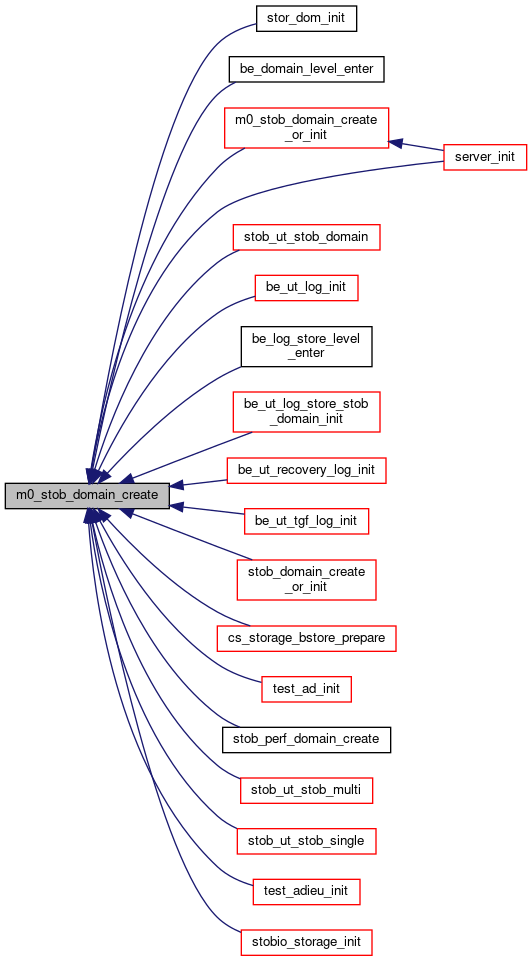
◆ m0_stob_domain_create_or_init()
| M0_INTERNAL int m0_stob_domain_create_or_init | ( | const char * | location, |
| const char * | str_cfg_init, | ||
| uint64_t | dom_key, | ||
| const char * | str_cfg_create, | ||
| struct m0_stob_domain ** | out | ||
| ) |
Initialises stob domain. Creates new domain if initialisation fails.
- Note
- dom_key and str_cfg_create parameters is completely ignored if stob domain initialisation succeeds. m0_stob_domain_create() is not called in this case.
- Use this function if you don't care about reason of failure; otherwise m0_stob_domain_init() and m0_stob_domain_create() should be used instead.
Definition at line 262 of file domain.c.
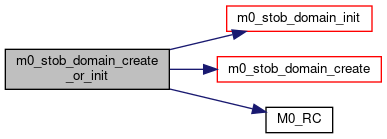
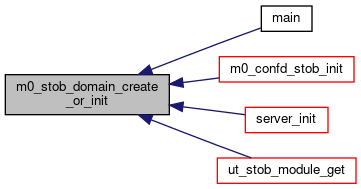
◆ m0_stob_domain_destroy()
| M0_INTERNAL int m0_stob_domain_destroy | ( | struct m0_stob_domain * | dom | ) |
Destroys a stob domain.
This function has implicit m0_stob_domain_fini() functionality, so domain is always finalised after call to this function.
Definition at line 227 of file domain.c.
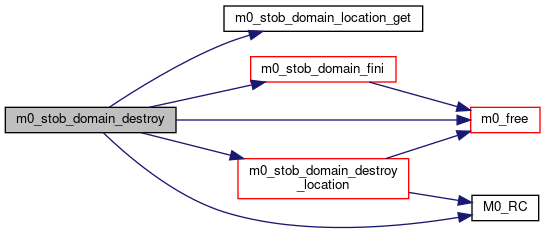
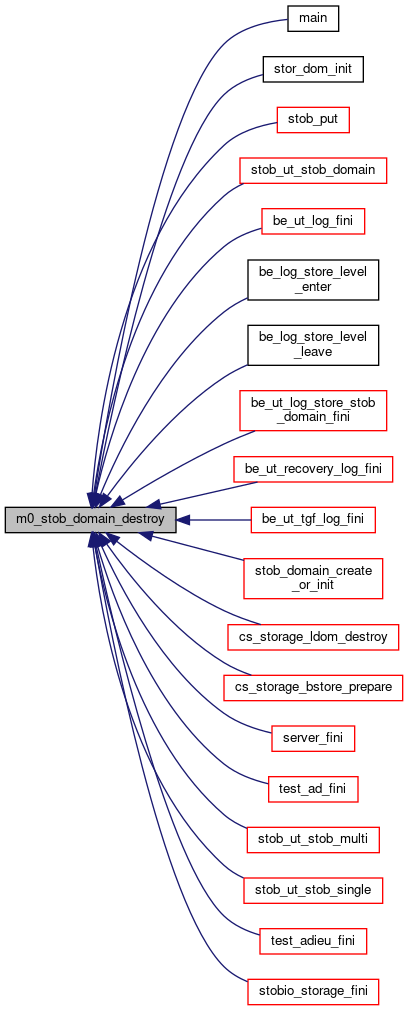
◆ m0_stob_domain_destroy_location()
| M0_INTERNAL int m0_stob_domain_destroy_location | ( | const char * | location | ) |
Destroys a stob domain.
Stob domain shouldn't be in initialised state at the time of the call.
Notes:
- it is possible to call this function again with the same location;
- if this function fails then stob domain is left in some intermediate state: m0_stob_domain_init() can't be called for this domain, and m0_stob_domain_create() will return error;
- the case when there is no such domain at specified is not considered as an error, 0 is returned.
Definition at line 242 of file domain.c.
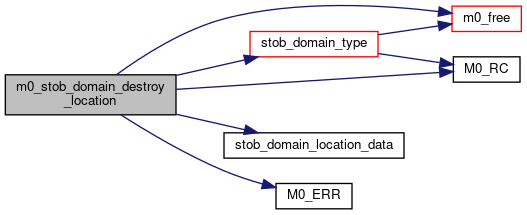
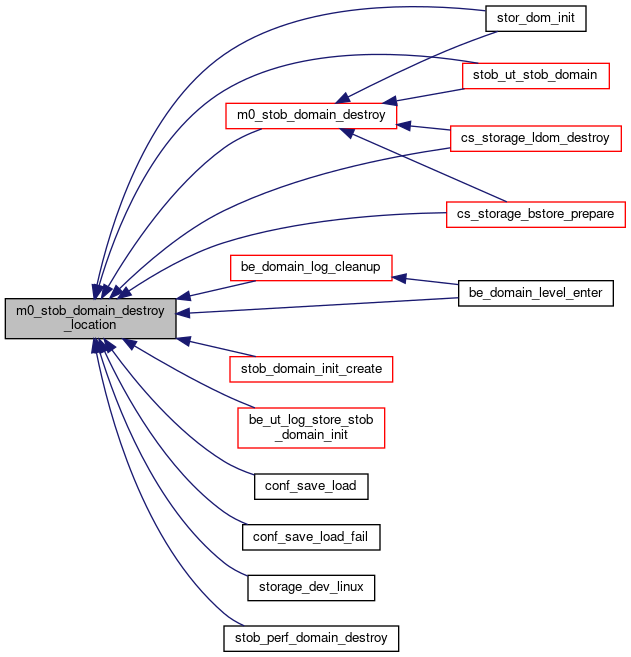
◆ m0_stob_domain_find()
| M0_INTERNAL struct m0_stob_domain * m0_stob_domain_find | ( | const struct m0_fid * | dom_id | ) |
Searches domain with the given dom_id that was previously initialised with m0_stob_domain_init() or m0_stob_domain_create().
Definition at line 278 of file domain.c.

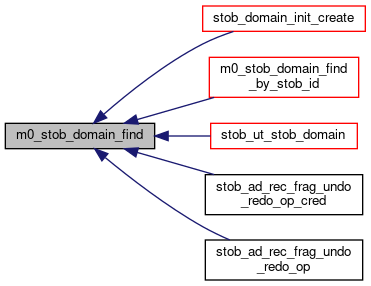
◆ m0_stob_domain_find_by_location()
| M0_INTERNAL struct m0_stob_domain * m0_stob_domain_find_by_location | ( | const char * | location | ) |
◆ m0_stob_domain_find_by_stob_id()
| M0_INTERNAL struct m0_stob_domain * m0_stob_domain_find_by_stob_id | ( | const struct m0_stob_id * | stob_id | ) |
◆ m0_stob_domain_fini()
| M0_INTERNAL void m0_stob_domain_fini | ( | struct m0_stob_domain * | dom | ) |
◆ m0_stob_domain_id_get()
| M0_INTERNAL const struct m0_fid * m0_stob_domain_id_get | ( | const struct m0_stob_domain * | dom | ) |
◆ m0_stob_domain_init()
| M0_INTERNAL int m0_stob_domain_init | ( | const char * | location, |
| const char * | str_cfg_init, | ||
| struct m0_stob_domain ** | out | ||
| ) |
◆ m0_stob_domain_is_of_type()
| M0_INTERNAL bool m0_stob_domain_is_of_type | ( | const struct m0_stob_domain * | dom, |
| const struct m0_stob_type * | dt | ||
| ) |
◆ m0_stob_domain_location_get()
| M0_INTERNAL const char * m0_stob_domain_location_get | ( | const struct m0_stob_domain * | dom | ) |
◆ m0_stob_fd()
| M0_INTERNAL int m0_stob_fd | ( | struct m0_stob * | stob | ) |
◆ m0_stob_fid_get()
◆ m0_stob_find()
| M0_INTERNAL int m0_stob_find | ( | const struct m0_stob_id * | id, |
| struct m0_stob ** | out | ||
| ) |
Returns an in-memory representation for a stob with a given key, creating the former if necessary.
Resulting m0_stob can be in any state. m0_stob_find() neither fetches the object attributes from the storage nor checks for object's existence. This function is used to create a placeholder on which other functions (m0_stob_locate(), m0_stob_create(), locking functions, etc.) can be called.
On success, this function acquires a reference on the returned object.
- Postcondition
- equi(rc == 0, *out != NULL)
Definition at line 92 of file stob.c.
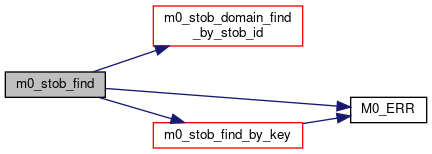

◆ m0_stob_find_by_key()
| M0_INTERNAL int m0_stob_find_by_key | ( | struct m0_stob_domain * | dom, |
| const struct m0_fid * | stob_fid, | ||
| struct m0_stob ** | out | ||
| ) |
◆ m0_stob_get()
| M0_INTERNAL void m0_stob_get | ( | struct m0_stob * | stob | ) |
◆ m0_stob_id_dom_id_get()
| M0_INTERNAL uint64_t m0_stob_id_dom_id_get | ( | const struct m0_stob_id * | stob_id | ) |
◆ m0_stob_id_eq()
| M0_INTERNAL bool m0_stob_id_eq | ( | const struct m0_stob_id * | stob_id0, |
| const struct m0_stob_id * | stob_id1 | ||
| ) |
◆ m0_stob_id_get()
| M0_INTERNAL const struct m0_stob_id * m0_stob_id_get | ( | struct m0_stob * | stob | ) |
◆ m0_stob_id_make()
| M0_INTERNAL void m0_stob_id_make | ( | uint64_t | container, |
| uint64_t | key, | ||
| const struct m0_fid * | dom_id, | ||
| struct m0_stob_id * | stob_id | ||
| ) |
◆ m0_stob_io_bufvec_launch()
| M0_INTERNAL int m0_stob_io_bufvec_launch | ( | struct m0_stob * | stob, |
| struct m0_bufvec * | bufvec, | ||
| int | op_code, | ||
| m0_bindex_t | offset | ||
| ) |
◆ m0_stob_io_credit()
| M0_INTERNAL void m0_stob_io_credit | ( | const struct m0_stob_io * | io, |
| const struct m0_stob_domain * | dom, | ||
| struct m0_be_tx_credit * | accum | ||
| ) |
Calculates BE tx credit for stob I/O operation.
- Parameters
-
io Defines operation. Only some fields should be filled. At least m0_stob_io::si_opcode, m0_stob_io::si_flags and m0_stob_io::si_stob.
- Note
- Only SIO_WRITE opcode is supported at the moment.
Definition at line 130 of file io.c.
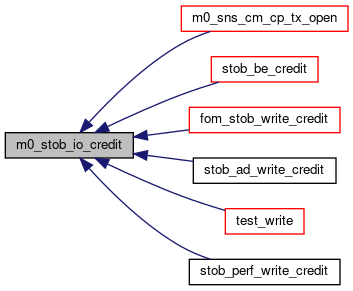
◆ m0_stob_io_fini()
| M0_INTERNAL void m0_stob_io_fini | ( | struct m0_stob_io * | io | ) |
◆ m0_stob_io_init()
| M0_INTERNAL void m0_stob_io_init | ( | struct m0_stob_io * | io | ) |
◆ m0_stob_io_launch()
| M0_INTERNAL int m0_stob_io_launch | ( | struct m0_stob_io * | io, |
| struct m0_stob * | obj, | ||
| struct m0_dtx * | tx, | ||
| struct m0_io_scope * | scope | ||
| ) |
- Precondition
- obj->so_state == CSS_EXISTS
- m0_chan_has_waiters(&io->si_wait)
- io->si_state == SIS_PREPARED
- io->si_opcode != SIO_INVALID
- m0_vec_count(&io->si_user.ov_vec) == m0_vec_count(&io->si_stob.ov_vec)
- m0_stob_io_user_is_valid(&io->si_user)
- m0_stob_io_stob_is_valid(&io->si_stob)
- Postcondition
- ergo(result != 0, io->si_state == SIS_IDLE)
- Note
- IO can be already completed by the time m0_stob_io_launch() finishes. Because of this no post-conditions for io->si_state are imposed in the successful return case.
Definition at line 192 of file io.c.
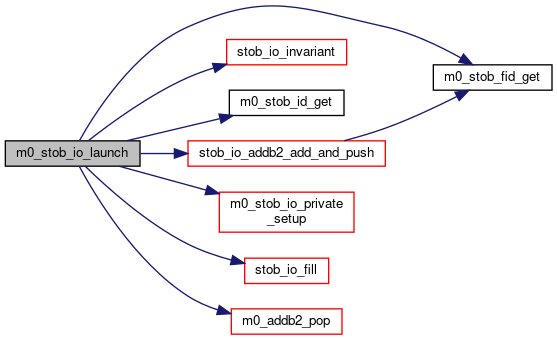

◆ m0_stob_io_prepare()
| M0_INTERNAL int m0_stob_io_prepare | ( | struct m0_stob_io * | io, |
| struct m0_stob * | obj, | ||
| struct m0_dtx * | tx, | ||
| struct m0_io_scope * | scope | ||
| ) |
- Precondition
- obj->so_state == CSS_EXISTS
- m0_chan_has_waiters(&io->si_wait)
- io->si_state == SIS_IDLE
- io->si_opcode != SIO_INVALID
- m0_vec_count(&io->si_user.ov_vec) == m0_vec_count(&io->si_stob.ov_vec)
- m0_stob_io_user_is_valid(&io->si_user)
- m0_stob_io_stob_is_valid(&io->si_stob)
- Postcondition
- ergo(result != 0, io->si_state == SIS_IDLE)
Definition at line 155 of file io.c.
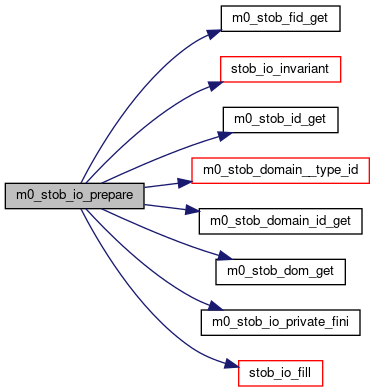

◆ m0_stob_io_prepare_and_launch()
| M0_INTERNAL int m0_stob_io_prepare_and_launch | ( | struct m0_stob_io * | io, |
| struct m0_stob * | obj, | ||
| struct m0_dtx * | tx, | ||
| struct m0_io_scope * | scope | ||
| ) |
- See also
- m0_stob_io_prepare() and m0_stob_io_launch().
Definition at line 219 of file io.c.
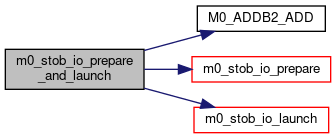
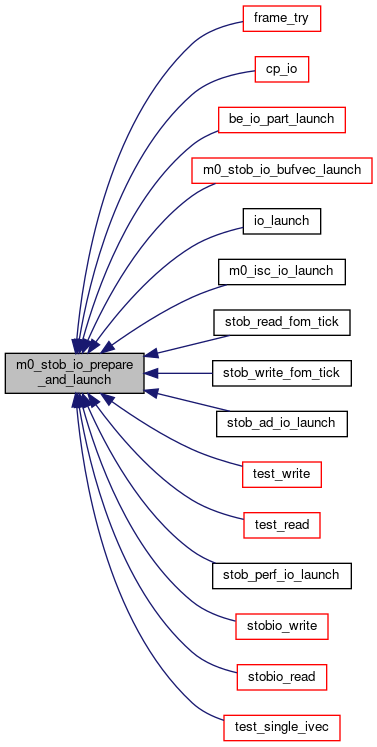
◆ m0_stob_io_private_fini()
|
static |
◆ m0_stob_io_private_setup()
| M0_INTERNAL int m0_stob_io_private_setup | ( | struct m0_stob_io * | io, |
| struct m0_stob * | obj | ||
| ) |
◆ m0_stob_io_stob_is_valid()
| M0_INTERNAL bool m0_stob_io_stob_is_valid | ( | const struct m0_indexvec * | stob | ) |
◆ m0_stob_io_user_is_valid()
| M0_INTERNAL bool m0_stob_io_user_is_valid | ( | const struct m0_bufvec * | user | ) |
◆ m0_stob_iovec_sort()
| M0_INTERNAL void m0_stob_iovec_sort | ( | struct m0_stob_io * | stob | ) |
◆ m0_stob_locate()
| M0_INTERNAL int m0_stob_locate | ( | struct m0_stob * | stob | ) |
Locates the stob on the storage, fetching its attributes.
- Precondition
- stob->so_ref > 0
- stob->so_state == CSS_UNKNOWN
- Postcondition
- ergo(rc == 0, M0_IN(m0_stob_state_get(stob), (CSS_EXISTS, CSS_NOENT)))
Definition at line 128 of file stob.c.
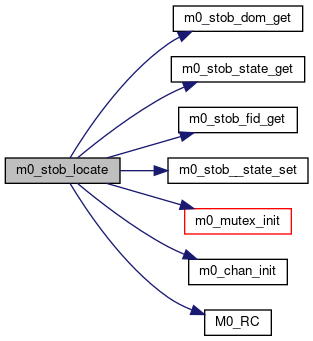

◆ m0_stob_lookup()
| M0_INTERNAL int m0_stob_lookup | ( | const struct m0_stob_id * | id, |
| struct m0_stob ** | out | ||
| ) |
The same as m0_stob_find() but without m0_stob allocation.
Definition at line 119 of file stob.c.


◆ m0_stob_lookup_by_key()
| M0_INTERNAL int m0_stob_lookup_by_key | ( | struct m0_stob_domain * | dom, |
| const struct m0_fid * | stob_fid, | ||
| struct m0_stob ** | out | ||
| ) |
◆ m0_stob_mod_fini()
◆ m0_stob_mod_init()
◆ m0_stob_module__get()
| M0_INTERNAL struct m0_stob_module* m0_stob_module__get | ( | void | ) |
◆ m0_stob_punch()
| M0_INTERNAL int m0_stob_punch | ( | struct m0_stob * | stob, |
| struct m0_indexvec * | range, | ||
| struct m0_dtx * | dtx | ||
| ) |
◆ m0_stob_punch_credit()
| M0_INTERNAL int m0_stob_punch_credit | ( | struct m0_stob * | stob, |
| struct m0_indexvec * | want, | ||
| struct m0_indexvec * | got, | ||
| struct m0_be_tx_credit * | accum | ||
| ) |
Calculates BE tx credit for m0_stob_punch operation. The method of credits calculation is similar to m0_stob_destroy_credit operation, except for punch_credit, the credits are calculated only for the range of segments provided by user.
Definition at line 223 of file stob.c.

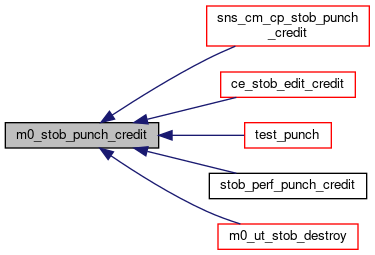
◆ m0_stob_put()
| M0_INTERNAL void m0_stob_put | ( | struct m0_stob * | stob | ) |
Releases reference to the stob.
When the last reference is released, the object can be either returned to the cache or immediately freed at the storage object domain discretion. A cached object can be freed at any time.
Definition at line 291 of file stob.c.
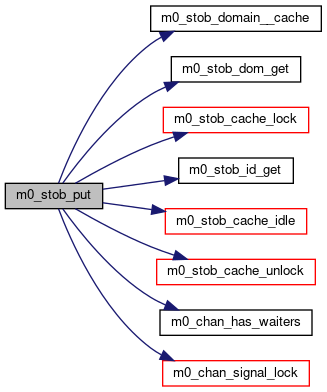
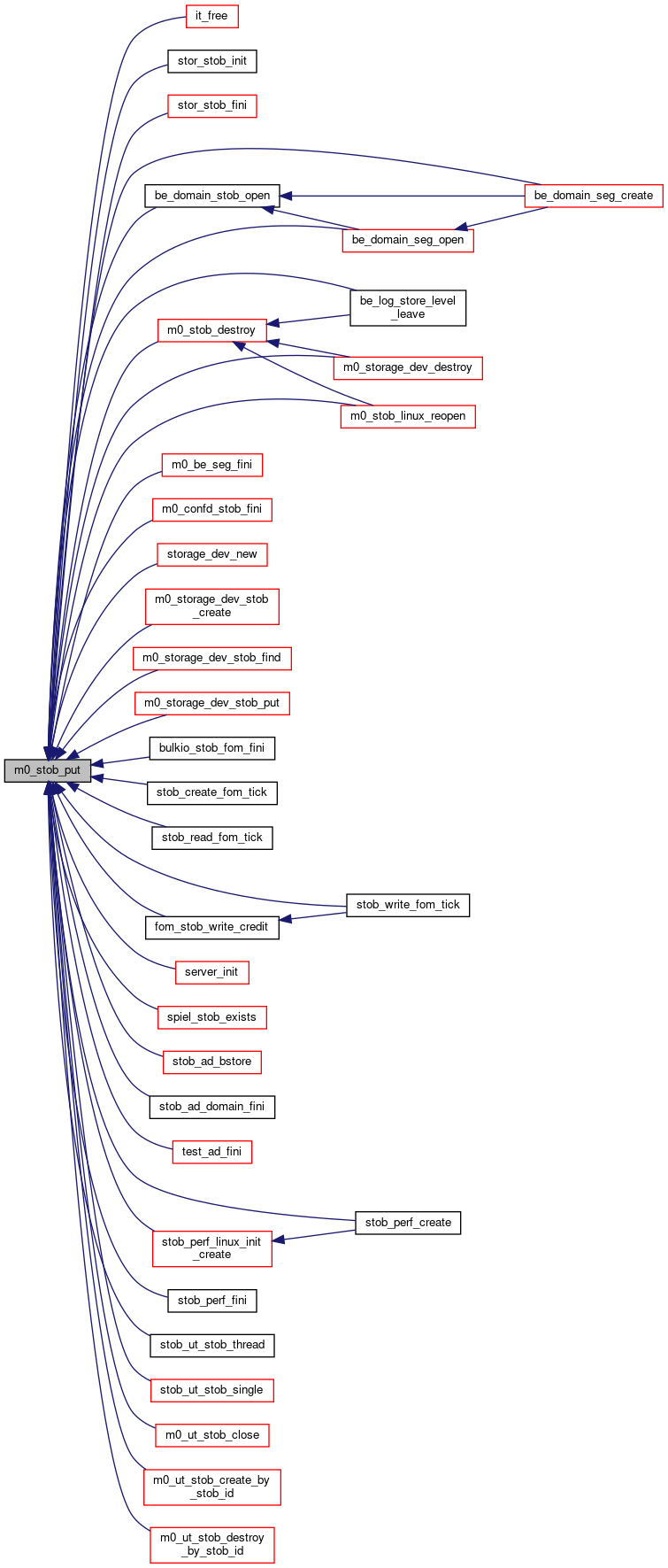
◆ m0_stob_state_get()
| M0_INTERNAL enum m0_stob_state m0_stob_state_get | ( | struct m0_stob * | stob | ) |
Returns stob state.
- See also
- m0_stob_state
Definition at line 265 of file stob.c.
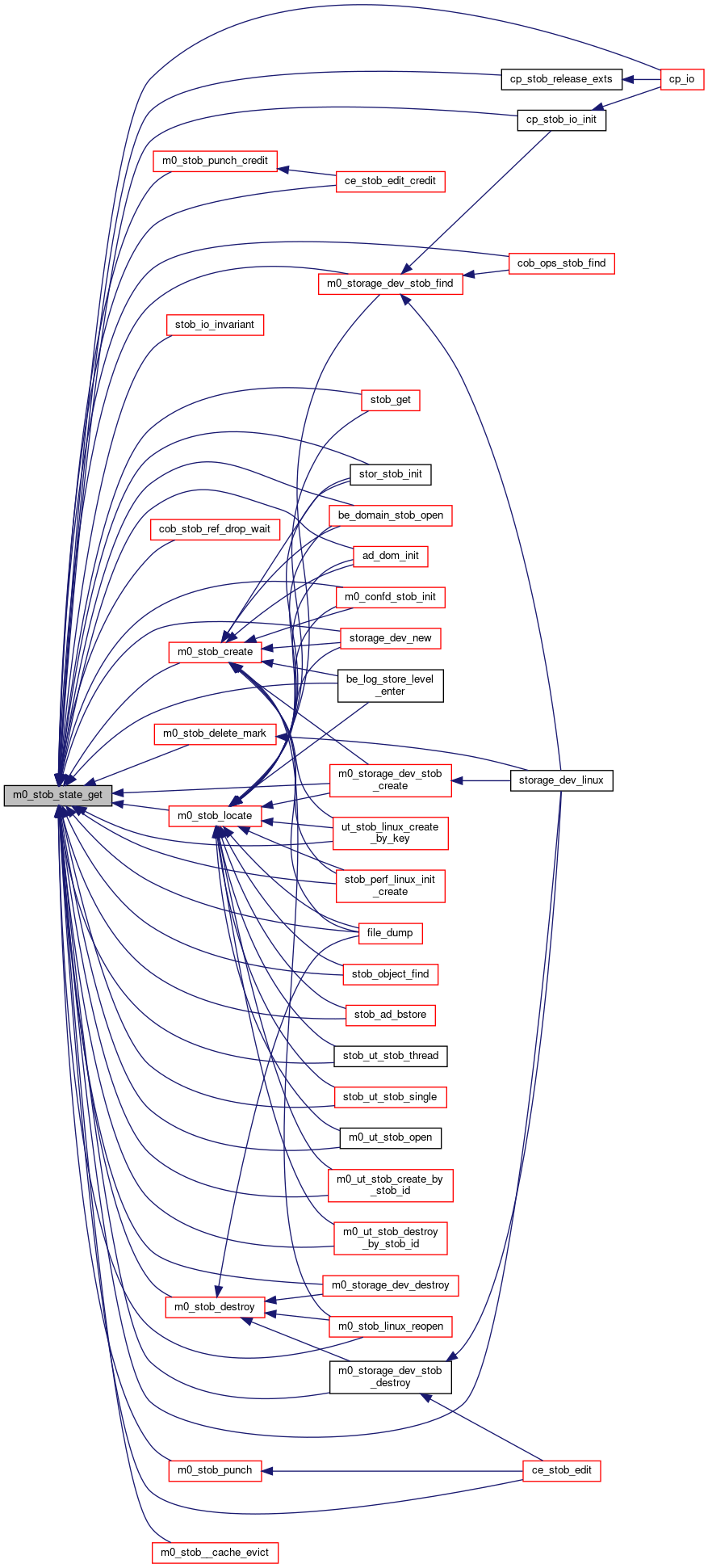
◆ m0_stob_type__dom_add()
| M0_INTERNAL void m0_stob_type__dom_add | ( | struct m0_stob_type * | type, |
| struct m0_stob_domain * | dom | ||
| ) |
◆ m0_stob_type__dom_del()
| M0_INTERNAL void m0_stob_type__dom_del | ( | struct m0_stob_type * | type, |
| struct m0_stob_domain * | dom | ||
| ) |
◆ m0_stob_type__dom_find()
| M0_INTERNAL struct m0_stob_domain * m0_stob_type__dom_find | ( | struct m0_stob_type * | type, |
| const struct m0_fid * | dom_id | ||
| ) |
◆ m0_stob_type__dom_find_by_location()
| M0_INTERNAL struct m0_stob_domain * m0_stob_type__dom_find_by_location | ( | struct m0_stob_type * | type, |
| const char * | location | ||
| ) |
The same as m0_stob_type__dom_find(), but it performs search by domain location.
- See also
- m0_stob_type__dom_find().
Definition at line 204 of file type.c.


◆ m0_stob_type_by_dom_id()
| M0_INTERNAL struct m0_stob_type * m0_stob_type_by_dom_id | ( | const struct m0_fid * | id | ) |
◆ m0_stob_type_by_name()
| M0_INTERNAL struct m0_stob_type * m0_stob_type_by_name | ( | const char * | name | ) |
◆ m0_stob_type_deregister()
| M0_INTERNAL void m0_stob_type_deregister | ( | struct m0_stob_type * | type | ) |
◆ m0_stob_type_id_by_name()
| M0_INTERNAL uint8_t m0_stob_type_id_by_name | ( | const char * | name | ) |
◆ m0_stob_type_id_get()
| M0_INTERNAL uint8_t m0_stob_type_id_get | ( | const struct m0_stob_type * | type | ) |
◆ m0_stob_type_name_get()
| M0_INTERNAL const char * m0_stob_type_name_get | ( | struct m0_stob_type * | type | ) |
◆ m0_stob_type_register()
| M0_INTERNAL void m0_stob_type_register | ( | struct m0_stob_type * | type | ) |
◆ m0_stob_types_fini()
| M0_INTERNAL void m0_stob_types_fini | ( | void | ) |
◆ m0_stob_types_init()
| M0_INTERNAL int m0_stob_types_init | ( | void | ) |
◆ m0_stob_ut_ad_fini()
| void m0_stob_ut_ad_fini | ( | struct m0_be_ut_backend * | ut_be, |
| struct m0_be_ut_seg * | ut_seg | ||
| ) |
◆ m0_stob_ut_ad_init()
| void m0_stob_ut_ad_init | ( | struct m0_be_ut_backend * | ut_be, |
| struct m0_be_ut_seg * | ut_seg, | ||
| bool | use_small_credits | ||
| ) |
◆ m0_stob_ut_adieu_ad()
| void m0_stob_ut_adieu_ad | ( | void | ) |
◆ m0_stob_ut_adieu_linux()
| void m0_stob_ut_adieu_linux | ( | void | ) |
◆ m0_stob_ut_adieu_perf()
| void m0_stob_ut_adieu_perf | ( | void | ) |
◆ M0_TL_DEFINE() [1/2]
| M0_TL_DEFINE | ( | domains | , |
| static | , | ||
| struct m0_stob_domain | |||
| ) |
◆ M0_TL_DEFINE() [2/2]
| M0_TL_DEFINE | ( | types | , |
| static | , | ||
| struct m0_stob_type | |||
| ) |
◆ M0_TL_DESCR_DEFINE() [1/2]
| M0_TL_DESCR_DEFINE | ( | domains | , |
| "stob domains" | , | ||
| static | , | ||
| struct m0_stob_domain | , | ||
| sd_domain_linkage | , | ||
| sd_magic | , | ||
| M0_STOB_DOMAINS_MAGIC | , | ||
| M0_STOB_DOMAINS_HEAD_MAGIC | |||
| ) |
◆ M0_TL_DESCR_DEFINE() [2/2]
| M0_TL_DESCR_DEFINE | ( | types | , |
| "stob types" | , | ||
| static | , | ||
| struct m0_stob_type | , | ||
| st_type_linkage | , | ||
| st_magic | , | ||
| M0_STOB_TYPES_MAGIC | , | ||
| M0_STOB_TYPES_HEAD_MAGIC | |||
| ) |
◆ M0_XCA_DOMAIN() [1/2]
| struct m0_stob_ioq_error M0_XCA_DOMAIN | ( | rpc | ) |
◆ M0_XCA_DOMAIN() [2/2]
| struct m0_stob_id M0_XCA_DOMAIN | ( | be| | rpc | ) |
◆ malloc_reserve_extent()
|
static |
◆ mock_balloc_alloc()
|
static |
◆ mock_balloc_fini()
|
static |
◆ mock_balloc_free()
|
static |
◆ mock_balloc_init()
|
static |
◆ punch_test()
|
static |
◆ stob_domain_cache_evict_cb()
|
static |
◆ stob_domain_create()
|
static |
◆ stob_domain_init()
|
static |
◆ stob_domain_init_create()
|
static |
◆ stob_domain_location_data()
|
static |
◆ stob_domain_type()
|
static |
◆ stob_io_addb2_add_and_push()
|
static |
◆ stob_io_fill()
|
static |
◆ stob_io_invariant()
|
static |
◆ stob_type_copy()
|
static |
◆ stob_types_destroy_list()
|
static |
◆ stob_types_get()
|
static |
◆ test_ad()
|
static |
◆ test_ad_fini()
|
static |
◆ test_ad_init()
|
static |
◆ test_ad_rw_unordered()
|
static |
◆ test_ad_undo()
|
static |
◆ test_adieu()
|
static |
◆ test_adieu_fini()
|
static |
◆ test_adieu_init()
|
static |
◆ test_punch()
|
static |
◆ test_read()
|
static |
◆ test_write() [1/2]
|
static |
◆ test_write() [2/2]
|
static |
◆ ub_fini()
|
static |
◆ ub_init()
|
static |
◆ ub_iovec_init()
|
static |
◆ ub_iovec_invert()
|
static |
◆ ub_iovec_sort()
|
static |
◆ ub_iovec_sort_invert()
|
static |
◆ ub_read()
|
static |
◆ ub_write()
|
static |
Variable Documentation
◆ block_shift [1/2]
◆ block_shift [2/2]
◆ buf_size [1/2]
◆ buf_size [2/2]
◆ clink [1/2]
◆ clink [2/2]
◆ dom
|
static |
◆ dom_back
|
static |
◆ dom_fore
|
static |
◆ f
◆ g_tx
◆ io [1/2]
|
static |
◆ io [2/2]
|
static |
◆ linux_location
|
static |
◆ linux_path
◆ m0_ad_ub
| struct m0_ub_set m0_ad_ub |
◆ m0_adieu_ub
◆ m0_stob_null_type
| const struct m0_stob_type m0_stob_null_type |
◆ M0_XCA_DOMAIN
| struct m0_stob M0_XCA_DOMAIN |
◆ M0_XCA_ENUM
| enum m0_addb2_stio_req_labels M0_XCA_ENUM |
◆ mb
| struct mock_balloc mb |
◆ mock_balloc_ops
|
static |
◆ obj
◆ obj_back
◆ obj_fore
◆ perf_location
◆ perf_path
|
static |
◆ read_buf [1/2]
◆ read_buf [2/2]
◆ read_bufs [1/2]
◆ read_bufs [2/2]
◆ read_cksm_buf [1/2]
◆ read_cksm_buf [2/2]
◆ sc_busy
◆ sc_busy_hits
◆ sc_eviction_cb
| m0_stob_cache_eviction_cb_t sc_eviction_cb |
◆ sc_evictions
◆ sc_idle
◆ sc_idle_hits
◆ sc_idle_size
◆ sc_idle_used
◆ sc_lock
◆ sc_misses
◆ si_battr
| struct m0_bufvec si_battr |
A sequence of block attributes. Each element of this sequence is an array of N 64-bit values, where N is the number of block attributes used for this stob (i.e., number of 1-s in binary mask passed to ->sop_battr_set()).
For write, elements of this sequence are associated with the matching written blocks.
For read, the sequence is populated with the block attributes of read blocks.
◆ si_cksum
◆ si_cksum_nob_read
| m0_bcount_t si_cksum_nob_read |
◆ si_cksum_sz
| m0_bcount_t si_cksum_sz |
◆ si_count
| m0_bcount_t si_count |
◆ si_flags
| enum m0_stob_io_flags si_flags |
◆ si_fol_frag
| struct m0_fol_frag* si_fol_frag |
◆ si_id
◆ si_mutex
◆ si_obj
| struct m0_stob* si_obj |
◆ si_op
| const struct m0_stob_io_op* si_op |
◆ si_opcode
| enum m0_stob_io_opcode si_opcode |
◆ si_rc
| int32_t si_rc |
◆ si_scope
| struct m0_io_scope* si_scope |
◆ si_start
◆ si_state
| enum m0_stob_io_state si_state |
◆ si_stob
| struct m0_indexvec si_stob |
Where data are located in the storage object name-space.
Segments in si_stob must be non-overlapping and go in increasing offset order.
- Note
- extent sizes in m0_stob_io::si_stob.iv_vec.v_count[] and extent offsets in m0_stob_io::si_stob.ov_index[] are in block size units (as determined by m0_stob_op::sop_block_shift).
◆ si_stob_magic
| uint32_t si_stob_magic |
Stob type magic used to detect when m0_stob_io::si_stob_private can be re-used.
This field is set to the value of m0_stob_type::st_magic when m0_stob_io::si_stob_private is allocated. When the same m0_stob_io is used to queue IO again, the magic is compared against type magic of the target storage object. If magic differs (meaning that previous IO was against an object of different type), implementation private data at m0_stob_io::si_stob_private are freed and new private data are allocated. Otherwise, old private data are re-used.
- See also
- m0_stob_io::si_stob_private
- Note
- magic number is used instead of a pointer to a storage object or storage object class, to avoid pinning them for undefined amount of time.
- currently it is equal to stob type id
◆ si_stob_private
| void* si_stob_private |
Pointer to implementation private data associated with the IO operation.
This pointer is initialized when m0_stob_io is queued for the first time. When IO completes, the memory allocated by implementation is not immediately freed (the implementation is still guaranteed to never touch this memory while m0_stob_io is owned by a user).
- See also
- m0_stob_io::si_stob_magic
◆ si_tx
| struct m0_dtx* si_tx |
◆ si_unit_sz
| m0_bindex_t si_unit_sz |
◆ si_user
| struct m0_bufvec si_user |
Where data are located in the user address space.
- Note
- buffer sizes in m0_stob_io::si_user.ov_vec.v_count[] are in block size units (as determined by m0_stob_op::sop_block_shift). Buffer addresses in m0_stob_io::si_user.ov_buf[] must be shifted block-shift bits to the left.
◆ si_wait
| struct m0_chan si_wait |
◆ sio_fini
| void(* sio_fini) (struct m0_stob_io *io) |
Called by m0_stob_io_fini() to finalize implementation resources.
Also called when the same m0_stob_io is re-used for a different type of IO.
- See also
- m0_stob_io_private_fini().
◆ sio_launch
| int(* sio_launch) (struct m0_stob_io *io) |
Called by m0_stob_io_launch() to queue IO operation.
- Note
- This method releases lock before successful returning.
- Precondition
- io->si_state == SIS_BUSY
- Postcondition
- ergo(result != 0, io->si_state == SIS_IDLE)
◆ sio_prepare
| int(* sio_prepare) (struct m0_stob_io *io) |
Called by m0_stob_io_prepare() to capture metadata accroding to internal logic.
- Precondition
- io->si_state == SIS_PREPARED
- Postcondition
- ergo(result != 0, io->si_state == SIS_BUSY)
◆ stob_types_reg
|
static |
◆ stob_vc
|
static |
◆ stob_vec
|
static |
◆ stob_vec1
|
static |
◆ stob_vi
|
static |
◆ user_buf [1/2]
◆ user_buf [2/2]
◆ user_bufs [1/2]
◆ user_bufs [2/2]
◆ user_bufs1
◆ user_cksm_buf [1/2]
◆ user_cksm_buf [2/2]
◆ user_vc
|
static |
◆ user_vec
|
static |
◆ user_vec1
|
static |
◆ ut_be
| struct m0_be_ut_backend ut_be |
◆ ut_seg
| struct m0_be_ut_seg ut_seg |






